Recent Sof Drashes
Shabbat HaGadol & Story
May 4, 2022
Drash by Reb Daniel Lev

According to the great scholar of the Jewish Time-Cycle, Reb Eliyahu KiTov,
For as long as the days of the Tanna’im and Amora’im, it has been customary in Jewish communities throughout the world for the outstanding Torah scholar of the congregation to address all people on this Shabbat. The purpose of this address is to teach the people the ways of G-d and instruct them in the laws of Passover.
From the Book of Our Heritage by Reb Eliyahu KiTov
Oy Vey! An outstanding Torah scholar of the congregation! Teaching the laws of Pesach! It’s a tribute to this community that anyone can get up here and try to fill those shoes. Fortunately, Reb KiTov also observed that the rabbi can “…add other material that speaks to the heart, as well subjects of topical interest.” Whew!
Shabbat HaGadol, along with Shabbat Shuva, are the two times a year that the Darshan, the Torah Drasher, gives a lengthy talk. So I guess during the rest of the year they give Torah quickies. Shabbat HaGadol invites us to think big, think real, like a people freed from the constricted consciousness of Mitzraim. Pesach freed us from the constriction of Egypt and even began our liberation from slave mentality. And as we prepare for our seders and a week of Matza feasting, it’s good to be aware that as we enter the barrage of words filling the pages of our Haggadot, we can also free ourselves a little from overly obsessing on the intense details laid out in the Haggadah and open ourselves to experience the core meanings of the seder: freedom, love, open thought, joyous celebration and our centuries-long passion for justice – these days for people struggling in the United States and the entire world. In this spirit, let me tell you a story.
 Levi Yitzchak, the great spiritual master and Chassidic rebbe of Berdichev in Ukraine awoke on the first morning of Passover and was quite satisfied with himself – in fact, you could say that he felt a bit full of himself! “Oy! – what a great seder I led!” he mused to himself. “I completed every detail and even infused it with the inside of the outside and the outside of the inside of many delicious mystical intentions throughout the Haggadah. Surely this was the best seder ever.” At that moment the rebbe heard a voice from Heaven which whispered into his ear: “Ah…but the seder of Chaim the watercarrier was much more pleasing in the eyes of HaShem.”
Levi Yitzchak, the great spiritual master and Chassidic rebbe of Berdichev in Ukraine awoke on the first morning of Passover and was quite satisfied with himself – in fact, you could say that he felt a bit full of himself! “Oy! – what a great seder I led!” he mused to himself. “I completed every detail and even infused it with the inside of the outside and the outside of the inside of many delicious mystical intentions throughout the Haggadah. Surely this was the best seder ever.” At that moment the rebbe heard a voice from Heaven which whispered into his ear: “Ah…but the seder of Chaim the watercarrier was much more pleasing in the eyes of HaShem.”
“Oy Gevalt!” thought Levi Yitzchak, “I must find this rabbi Chaim so I can learn from him the deepest way to conduct a seder.” So the rebbe sent his Chasidim to scour the region to find a “Rabbi Chaim.” After a couple of hours they returned empty-handed and said, “Rebbe, no one has ever heard of a Rabbi Chaim.” So, Reb Levi Yitzchak sent them to find the prominent community member named Chaim. Nothing. Eventually, he told them to go through every part of the area, rich and poor, and see if they could find a Chaim the water carrier.
An hour later, Yankel and Shmuly, two of his Chasidim, knocked on the door of a humble home on the outskirts of town. The woman who answered told them, “Yes my husband is the person you seek.” When the men said they needed to bring him to the rebbe she responded that they couldn’t even talk to him because he was still sleeping. Being on a mission from Rebbe Levi Yitzchak, they wasted no time and entered the house, finding Chaim asleep in his bed. They lifted him up and half-carried him to the home of their rebbe. After Chaim, now fully awake, sat in a chair across from Levi Yitzchak, the rebbe asked him, “Tell me dear heart, with what mystical intention did you engage in searching for the chametz in your home?”
 Chaim thought for a few moments and said, “Well rebbe, like all good Jews, I went through the house that night and gathered all the pieces of chametz my children hid for me. Then … I remember I put it on top of my dish cabinet … Oh yes! – Then my neighbor came in and needed me to help his with his cow that was giving birth and … Oy! I forgot to burn the chametz and its still on top of the cabinet!” Reb Levi Yitzchak was a little shocked. He thought back to earlier when he heard the voice telling him about Chaim and he thought, “Well, anyone can hear a voice. And its not always clear if the voice is from Heaven or someplace else.” Still, the rebbe wanted to ask one more question: “Tell me Reb Chaim, how did you do your seder?”
Chaim thought for a few moments and said, “Well rebbe, like all good Jews, I went through the house that night and gathered all the pieces of chametz my children hid for me. Then … I remember I put it on top of my dish cabinet … Oh yes! – Then my neighbor came in and needed me to help his with his cow that was giving birth and … Oy! I forgot to burn the chametz and its still on top of the cabinet!” Reb Levi Yitzchak was a little shocked. He thought back to earlier when he heard the voice telling him about Chaim and he thought, “Well, anyone can hear a voice. And its not always clear if the voice is from Heaven or someplace else.” Still, the rebbe wanted to ask one more question: “Tell me Reb Chaim, how did you do your seder?”
“Oh Rebbe!” Chaim now lit up like a Chanukia and related the story: “Well, you know that on the holiday we are not allowed to drink any grain alcohol for eight days and … well … ah …you could say that I usually have one or two drinks every day. So, I decided that since I’d have to miss all those drinks throughout the holiday I may as well have them all now. So, after I finished my work before seder night I drank all fourteen shots. Well, as you might guess I was a little tired and decided to lay down to rest before the seder.”
Chaim continued, “At about 9 pm my wife woke me and told me it was time to do the seder. I told her to let me sleep a little longer. She tried to wake me at ten and eleven with no success. Finally, she poured cold water on me at 11:30 and with tears in her eyes she said, ‘Chaim, why can’t you be like all the other fathers and lead a seder for your children.’ I saw my children standing just behind her and felt a little ashamed. I went with them to the seder table and we all sat down. I saw that we had very little to celebrate the holiday with. Then, a big feeling came over me and I told my family, ‘I know so little about the holiday because I’m a poor, ignorant Jew. All I know … all I know is that on seder night we remember that we were slaves and HaShem took us out of slavery with his arms, gathering us up and setting us free … and that we must remember every year to be free and love each other.’”
 Chaim recalled, “And just as I finished telling my family this a great white light filled our little room … it blinded us for a bit and when it faded we saw that our table was filled with all kinds of delicious Pesach food. I poured some wine and gave it to my wife and children and I said, ‘See here, HaShem is blessing us with a beautiful seder.’ We ate and drank, sang and prayed and then I went to bed.” So now … Rebbe Levi Yitchak knew what kind of seder was more pleasing to Heaven then his own – with all its attention to detail and formal Kavvanot (intentions). He knew that this man’s simple seder, from the heart, was more precious.
Chaim recalled, “And just as I finished telling my family this a great white light filled our little room … it blinded us for a bit and when it faded we saw that our table was filled with all kinds of delicious Pesach food. I poured some wine and gave it to my wife and children and I said, ‘See here, HaShem is blessing us with a beautiful seder.’ We ate and drank, sang and prayed and then I went to bed.” So now … Rebbe Levi Yitchak knew what kind of seder was more pleasing to Heaven then his own – with all its attention to detail and formal Kavvanot (intentions). He knew that this man’s simple seder, from the heart, was more precious.
Messages from HaShem
May 2, 2022
Shemini Drash by Marc Flitter
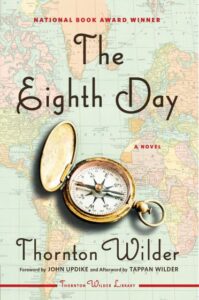 As Abraham Joshua Heschel observed, ”All is Torah.” So it was no surprise to me as I was preparing this Drash on Parsha Shemini, the eighth day, that I recalled the circumstances of another encounter with the Eighth Day. When I was a medical student in 1967, my best friend’s uncle managed The Edgartown Hotel in Martha’s Vineyard. On our vacations we would be treated to free room and board at this stately accommodation and would spend our Sunday mornings in a tavern in nearby Vineyard Haven reading the Sunday New York Times. On such an occasion an elderly man approached our table and asked to join us. He introduced himself as Thorton Wilder. He wanted to know about us, where we were from, what we did and what we hoped to do. And then I was able to ask him a question which had been troubling me since reading his recently published novel entitled The Eighth Day. Wilder had bound the reader to the novel’s protagonist, John Ashley, through a complex journey of escape, adventure, and accomplishment only to dispatch him with the singular phrase, “He drowned at sea.”
As Abraham Joshua Heschel observed, ”All is Torah.” So it was no surprise to me as I was preparing this Drash on Parsha Shemini, the eighth day, that I recalled the circumstances of another encounter with the Eighth Day. When I was a medical student in 1967, my best friend’s uncle managed The Edgartown Hotel in Martha’s Vineyard. On our vacations we would be treated to free room and board at this stately accommodation and would spend our Sunday mornings in a tavern in nearby Vineyard Haven reading the Sunday New York Times. On such an occasion an elderly man approached our table and asked to join us. He introduced himself as Thorton Wilder. He wanted to know about us, where we were from, what we did and what we hoped to do. And then I was able to ask him a question which had been troubling me since reading his recently published novel entitled The Eighth Day. Wilder had bound the reader to the novel’s protagonist, John Ashley, through a complex journey of escape, adventure, and accomplishment only to dispatch him with the singular phrase, “He drowned at sea.”
I had found that encounter in my reading what I might best term “arresting.” It is a reaction that I similarly experience each year when reading three events as chronicled in the Torah. In the book of Genesis, in Parsha Vayishlach, Jacob is accosted by a man who wrestles with him until dawn. In the book of Exodus, in Parsha Shemos, Moses encounters Hashem, who seeks to kill him. Lastly, as we read this week in the book of Leviticus, Parsha Shemini, a fire comes forth from before Hashem to consume Aaron’s sons, Nadab and Abihu. I have come to realize why I find these incidents similarly arresting. It is the abrupt visitation of divine violence inflicted upon the righteous. But can these three narratives be seen through the same lens? Perhaps with closer scrutiny the deaths of Aaron’s sons should inspire neither pause nor astonishment.
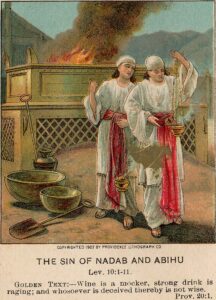 There can be little disagreement that the assaults visited upon Moses and Jacob had sparse predicates. It was when Moses was “on the way” returning to Egypt “in the lodging that Hashem encountered Moses and sought to kill him.” Jacob was “left alone during the night” having sent his two wives, his two handmaids, his eleven sons and his possessions across the ford of the Jabbok “when a man wrestled with him until the break of dawn.” But the deaths of Aaron’s sons occur in the weight of accumulating details that bear an undeniable momentum. Hashem has commanded that a sanctuary be built so that the Schechina may reside among the people.The details of the construction of this sanctuary including the specific materials to be used and the artisans commanded to do the work have also been revealed. We have been informed in similar detail regarding the fashioning of the garments that the officiants of the priestly class are commanded to wear during the performance of their duties. And lastly the regimented content and order of those duties have been similarly prescribed.
There can be little disagreement that the assaults visited upon Moses and Jacob had sparse predicates. It was when Moses was “on the way” returning to Egypt “in the lodging that Hashem encountered Moses and sought to kill him.” Jacob was “left alone during the night” having sent his two wives, his two handmaids, his eleven sons and his possessions across the ford of the Jabbok “when a man wrestled with him until the break of dawn.” But the deaths of Aaron’s sons occur in the weight of accumulating details that bear an undeniable momentum. Hashem has commanded that a sanctuary be built so that the Schechina may reside among the people.The details of the construction of this sanctuary including the specific materials to be used and the artisans commanded to do the work have also been revealed. We have been informed in similar detail regarding the fashioning of the garments that the officiants of the priestly class are commanded to wear during the performance of their duties. And lastly the regimented content and order of those duties have been similarly prescribed.
Beginning in last week’s Parsha Tzav, Moses, as he had been commanded, assembled the people before Aaron and his sons for the inauguration ceremony. He had dressed them in their priestly garb and anointed them and all the sanctuary with the oil of anointing. As Hashem had commanded Moses he had instructed Aaron and his sons as to the performance of the sacrificial offerings and that they were to remain before the sanctuary for a period of seven days and seven nights. And so, as they perform what had been commanded by Hashem, we encounter this week’s parsha Shemini, the eighth day, the culmination of this monumental collective effort. We can notice that the actions of Nadab and Abihu appear to differ from the mundane predicates to what befell Jacob and later Moses. For Moses had simply paused at the lodge and Jacob, as the narrative relates, found himself alone in the night.
But on the eighth day of the inauguration, amidst the repetitive pomp and circumstance, immediately following the appearance of a divine flame that had consumed the elevation offering on the altar, inspiring the people to fall on their faces and sing glad song, Nadab and Abihu each take their fire pan, place fire in the pans, and incense upon the fires. But Hashem had not commanded Moses nor had Moses instructed Aaron and his sons regarding these actions. What precedent had they hoped to achieve at this moment? Youthful exuberance manifesting itself as improvisational devotion seems unlikely.
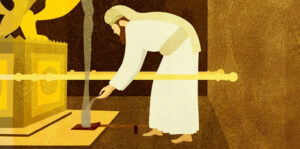 Aaron had four sons, but only Nadab and Abihu were so moved, suggesting that perhaps their performances had been planned, an agreement bordering on conspiracy. Were the tabernacle a palace it might have been a coup. To bring forth what is described as an alien fire, explicitly noted in the text as not having been commanded by Hashem, evokes the Gemara likening of arrogance to idolatry. The consequence of their actions is straightforward. A fire comes forth and consumes them, and they die before Hashem. There is no time for an intuited salvation through the performance of a circumcision, or the prophecy of an additional name. The arrested moment is upon us, with seemingly no enlightenment coming from the text. Jacob, the newly named Israel, was able to declare, “I have seen the Divine, face to face, and yet my life was spared.” Zippora, the agent of release having circumcised her son, understood her bride groom’s bloodshed was because of circumcision. Instead it is the words of Moses with which we and Aaron must enigmatically struggle. For Moses, addressing Aaron directly, states, “Of this did Hashem speak saying, I will be sanctified by those who are nearest me, thus will I be honored before the entire people.” We remain suspended here, for much of the understanding of the deaths of Nadab and Abihu hinges on the meaning of what Moses has shared. It is natural for us and the commentators to interpret what brother conveys to brother as words of consolation, what we ourselves might attempt to express if confronted with such familial tragedy. If our understanding is sympathetically correct then what Moses has offered to Aaron should be unshakeable, the balm of comfort addressing unbearable pain. Let us go to chapter and verse in the Torah where Hashem has so spoken.
Aaron had four sons, but only Nadab and Abihu were so moved, suggesting that perhaps their performances had been planned, an agreement bordering on conspiracy. Were the tabernacle a palace it might have been a coup. To bring forth what is described as an alien fire, explicitly noted in the text as not having been commanded by Hashem, evokes the Gemara likening of arrogance to idolatry. The consequence of their actions is straightforward. A fire comes forth and consumes them, and they die before Hashem. There is no time for an intuited salvation through the performance of a circumcision, or the prophecy of an additional name. The arrested moment is upon us, with seemingly no enlightenment coming from the text. Jacob, the newly named Israel, was able to declare, “I have seen the Divine, face to face, and yet my life was spared.” Zippora, the agent of release having circumcised her son, understood her bride groom’s bloodshed was because of circumcision. Instead it is the words of Moses with which we and Aaron must enigmatically struggle. For Moses, addressing Aaron directly, states, “Of this did Hashem speak saying, I will be sanctified by those who are nearest me, thus will I be honored before the entire people.” We remain suspended here, for much of the understanding of the deaths of Nadab and Abihu hinges on the meaning of what Moses has shared. It is natural for us and the commentators to interpret what brother conveys to brother as words of consolation, what we ourselves might attempt to express if confronted with such familial tragedy. If our understanding is sympathetically correct then what Moses has offered to Aaron should be unshakeable, the balm of comfort addressing unbearable pain. Let us go to chapter and verse in the Torah where Hashem has so spoken.
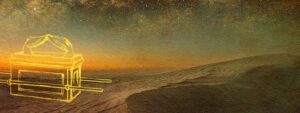 But here’s the rub, the citation is not to be found. In a paper published in 2018 by Rabbi David Frankel from the Schecter institute of Jewish studies in Jerusalem, Frankel concluded that no such direct communication from Hashem to Moses appears in the Torah, as we ourselves can confirm. The author did speculate on possible scenarios in which Moses might have interpreted previous communications from Hashem as sufficient predicate for what might qualify as poetic license. But what if this seemingly reflex pronouncement by Moses following the deaths of his brother’s sons was not an attempt at consolation? Perhaps instead of consolation Moses was preoccupied with exhortation. The immediacy of what would be required of Aaron to complete the inauguration of the Mishkan would not have been lost on Moses. Were Aaron to succumb to a father’s grief, what was intended to be a joyous occasion could have been transformed into an event bereft of its eternal meaning. What clearer message could Moses convey other than, It is we Aaron, you and I, those nearest to Hashem, by whom Hashem will be sanctified and honored by the entire people. There is precedent for understanding just such a message from Hashem. For in Exodus, following the incident of the assault upon Moses that we have been revisiting, the narrative immediately proceeds to Hashem directly addressing Aaron and instructing him to go to the wilderness in order to meet Moses. There Moses relates to Aaron the words of Hashem and what Hashem had commanded him. And the narrative continues, “Aaron spoke all the words that Hashem had spoken to Moses and he performed the signs in the sight of the people. And the people believed that Hashem had seen their affliction and had remembered them, then the people bowed their heads and prostrated themselves.” Was this not what Moses had reminded Aaron? For Hashem had been sanctified by those closest to him and honored in the eyes of the people.
But here’s the rub, the citation is not to be found. In a paper published in 2018 by Rabbi David Frankel from the Schecter institute of Jewish studies in Jerusalem, Frankel concluded that no such direct communication from Hashem to Moses appears in the Torah, as we ourselves can confirm. The author did speculate on possible scenarios in which Moses might have interpreted previous communications from Hashem as sufficient predicate for what might qualify as poetic license. But what if this seemingly reflex pronouncement by Moses following the deaths of his brother’s sons was not an attempt at consolation? Perhaps instead of consolation Moses was preoccupied with exhortation. The immediacy of what would be required of Aaron to complete the inauguration of the Mishkan would not have been lost on Moses. Were Aaron to succumb to a father’s grief, what was intended to be a joyous occasion could have been transformed into an event bereft of its eternal meaning. What clearer message could Moses convey other than, It is we Aaron, you and I, those nearest to Hashem, by whom Hashem will be sanctified and honored by the entire people. There is precedent for understanding just such a message from Hashem. For in Exodus, following the incident of the assault upon Moses that we have been revisiting, the narrative immediately proceeds to Hashem directly addressing Aaron and instructing him to go to the wilderness in order to meet Moses. There Moses relates to Aaron the words of Hashem and what Hashem had commanded him. And the narrative continues, “Aaron spoke all the words that Hashem had spoken to Moses and he performed the signs in the sight of the people. And the people believed that Hashem had seen their affliction and had remembered them, then the people bowed their heads and prostrated themselves.” Was this not what Moses had reminded Aaron? For Hashem had been sanctified by those closest to him and honored in the eyes of the people.
The narrative deals more extensively to the aftermath following the deaths of Nadab and Abihu in contrast to the events befalling Jacob and Moses, where without further comment previous themes are immediately resumed. The bodies of the brothers are to be dealt with. Moses instructs cousins of Nadab and Abihu to remove the corpses to the outside of the camp. And whether ceremoniously or not, the deceased are carried by their tunics. And then Moses articulates what we have hypothesized regarding the primacy of completing the task at hand. He admonishes Aaron and his two remaining sons to refrain from the customary public display of the grief stricken lest they die for inspiring the entire assembly to bewail the conflagration ignited by Hashem. Moses is direct. “Do not leave the tent of the meeting, the oil of annointment is upon you.” Father and sons carry out his bidding. The text continues with Hashem speaking directly to Aaron. Hashem commands, ”do not drink intoxicating wine, you and your sons when you come to the tent of the meeting.” The proximity in the text of this commandment to the offerings of an alien fire by Aaron’s sons has been cited to support the contention that their actions might have been the result of a wine-induced clouding of their judgment. Yet devotion under the influence, while encouraged during Purim, seems unlikely to have been responsible for the planned and choreographed disruption superimposed upon the performance of the inauguration ceremony.
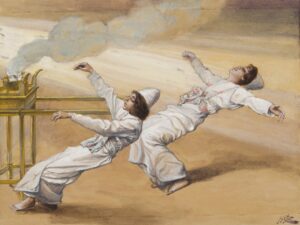 There is one final consequence to the deaths of Nadab and Abihu that must be dealt with, as if to confirm the ripple effect of their transgression. Portions of the sin offering of the he-goat, clearly identified in the text as having been sacrificed to attain atonement for the people, had not been eaten in a place of holiness as had been commanded by Hashem. Moses directs his wrath for this additional breach of protocol at Aaron’s surviving sons, Elazar and Ithamar, as if to emphasize that nothing had been left to chance or was in need of improvisation on this day. To understand what the text describes as his “insistent inquiring,” Moses had been commanded by Hashem that only if a portion of the sacrificial blood had been taken into the Tabernacle within the Holy, which had not occurred, was the entire sacrifice to be burned upon the altar. It is left to Aaron to respond, a response some cite as the first reference in the Torah to the application of the oral law. He first shares that it was he, not Elazar and Ithamar, who had offered the sin offering, placing upon himself responsibility for the omission. Aaron continues with the reasoned question whether or not a mourner should consume a portion of the sin offering. But it is the way he phrases the question to Moses that I find the most abject intimation of Hashem’s mercy to be found in our Bible. Who knows the weariness in his voice as he reasons with Moses concerning Hashem’s approval of a mourner’s obligations with the haunting phrase, “Now that such things befell me.”
There is one final consequence to the deaths of Nadab and Abihu that must be dealt with, as if to confirm the ripple effect of their transgression. Portions of the sin offering of the he-goat, clearly identified in the text as having been sacrificed to attain atonement for the people, had not been eaten in a place of holiness as had been commanded by Hashem. Moses directs his wrath for this additional breach of protocol at Aaron’s surviving sons, Elazar and Ithamar, as if to emphasize that nothing had been left to chance or was in need of improvisation on this day. To understand what the text describes as his “insistent inquiring,” Moses had been commanded by Hashem that only if a portion of the sacrificial blood had been taken into the Tabernacle within the Holy, which had not occurred, was the entire sacrifice to be burned upon the altar. It is left to Aaron to respond, a response some cite as the first reference in the Torah to the application of the oral law. He first shares that it was he, not Elazar and Ithamar, who had offered the sin offering, placing upon himself responsibility for the omission. Aaron continues with the reasoned question whether or not a mourner should consume a portion of the sin offering. But it is the way he phrases the question to Moses that I find the most abject intimation of Hashem’s mercy to be found in our Bible. Who knows the weariness in his voice as he reasons with Moses concerning Hashem’s approval of a mourner’s obligations with the haunting phrase, “Now that such things befell me.”
From Command to Enactment
April 4, 2022
Vayakhel Drash by Marc Flitter
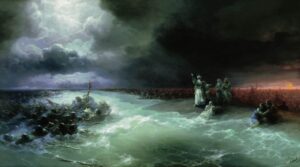 To read Vayakhel is to have a sense of deja vu. Wait, isn’t this almost a verbatim repetition of parsha Terumah that we read just a few short weeks ago? We know that every word, every letter of the Torah is accepted as being infused with a degree of meaning which ultimately defines the sublime. Yet reading Vayakhel leads us to the question, who edited this? Biblical scholarship purports that multiple human authors contributed to the Chumash. One might suspect the author designated as P, with expertise in all things priestly, was being paid by the word. But we have not come this far since Simchat Torah, collectively reexperiencing the narrative of Genesis, the majesty of creation, the audacity of Abraham, the love of Isaac for Rebecca and her for him,” I will go with the man,” the tenacity of Jacob, whose struggles were less with God than with men, an Aramean, his dissembling sons, a missing child, a death by the road, encountering again our ancestors enslaved by a Pharaoh, the analogy of a crucible of little comfort when deprived of straw, then to be delivered through God by a man named Moses, prophet of plagues, whom we followed through a parted sea to a burning mountain, once again to witness, as did our souls, the revelation, to utter “We will do and we will hear.”
To read Vayakhel is to have a sense of deja vu. Wait, isn’t this almost a verbatim repetition of parsha Terumah that we read just a few short weeks ago? We know that every word, every letter of the Torah is accepted as being infused with a degree of meaning which ultimately defines the sublime. Yet reading Vayakhel leads us to the question, who edited this? Biblical scholarship purports that multiple human authors contributed to the Chumash. One might suspect the author designated as P, with expertise in all things priestly, was being paid by the word. But we have not come this far since Simchat Torah, collectively reexperiencing the narrative of Genesis, the majesty of creation, the audacity of Abraham, the love of Isaac for Rebecca and her for him,” I will go with the man,” the tenacity of Jacob, whose struggles were less with God than with men, an Aramean, his dissembling sons, a missing child, a death by the road, encountering again our ancestors enslaved by a Pharaoh, the analogy of a crucible of little comfort when deprived of straw, then to be delivered through God by a man named Moses, prophet of plagues, whom we followed through a parted sea to a burning mountain, once again to witness, as did our souls, the revelation, to utter “We will do and we will hear.”
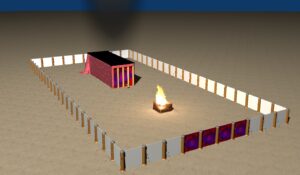 We have not experienced all of that just to accept Vayakhel as a scribal error, equivalent to the fat-fingered mistake of a financial transaction, only in this circumstance, one of inestimably valued consequence. But there is an alternative, to pursue what we must, return to the text with its tiered meanings. Progressing from the literal to the subtle, to derivations, and finally for those who dare to embrace the Sefirot, become gathered into the mystical. In Vayakhel it is an effort with no small reward. For in our textual return, we may experience a transformation from command in Terumah to execution in Vayakhel. The earlier narrative that foretells the construction of the Mishkan assembles in Vayakhel with a clarity of recognition that becomes palpable. If we allow ourselves, we are witness to the tumult of the enterprise. There is what seems to be a marketplace, but not for buying or selling, only giving. The accumulating goods belie any notion of secondhand discards. They include gold bracelets and gold rings,
We have not experienced all of that just to accept Vayakhel as a scribal error, equivalent to the fat-fingered mistake of a financial transaction, only in this circumstance, one of inestimably valued consequence. But there is an alternative, to pursue what we must, return to the text with its tiered meanings. Progressing from the literal to the subtle, to derivations, and finally for those who dare to embrace the Sefirot, become gathered into the mystical. In Vayakhel it is an effort with no small reward. For in our textual return, we may experience a transformation from command in Terumah to execution in Vayakhel. The earlier narrative that foretells the construction of the Mishkan assembles in Vayakhel with a clarity of recognition that becomes palpable. If we allow ourselves, we are witness to the tumult of the enterprise. There is what seems to be a marketplace, but not for buying or selling, only giving. The accumulating goods belie any notion of secondhand discards. They include gold bracelets and gold rings,
gold body ornaments, body ornaments of all kinds. There are turquoise, purple, and scarlet yarns, skins of goat hair, Tachas and red dyed ram. There is silver and copper and amidst us is the aroma of oil and spices and incense, all framed by imposing stores of acacia wood and a solitary delicate table for stones.
We are told in the text what inspired these givers, as shared with Moses by Hashem. They are “motivated by their hearts” to give these gifts, and so too the craftsmen, the doers of the work, revealed by Hashem to be “the wise hearted among the people.” We are surrounded by this multitude with their motivations and their wisdom. And who are we to second guess the knower of all hearts? Except we know our own hearts, what we might sense in our own depths were we so recently traumatized by the shame of acquiescence, having perceived in the distance a golden calf and somehow remaining silent amidst the rumors of an impending festival.
True, the actual perpetrators are all dead, killed by the Levites and Hashem. But the guilt of inaction is a heavy burden. Until now! Now this opportunity for atonement through giving and craftsmanship for the sake of the Mishkan where Hashem’s immediacy is to reside among them. No wonder this observed fervor on the part of the people. There is a further stirring, a wave of excitement as can only be occasioned by the status of celebrity. For who goes there? Is it not the chosen one designated as the master craftsman? It is Bezalel. The significance of his selection does not go unnoticed. For he is the grandson of the martyred Hur, the solitary voice of protest opposing that golden calf. It is further proof that the people have not been led astray. Their hearts have seized upon this earnestly hoped for opportunity for forgiveness. And as if it were possible, there is more, perhaps apparent to them, but surely to us. For despite the seeming redundancy of Vayakhel to Terumah there is a minor variation, a verse or two, hardly noticeable, almost understatement. At the beginning of Vayakhel Moses relates Hashem’s commandment that “on six days work may be done but the seventh day shall be holy to you.”
All of this, the inspired masses, the goods in such abundance that the people are soon to be directed to cease and desist in their giving, the chosen grandson, and now as if this were not enough, “Dayenu!” There shall be a seventh day, holy to the people, enduring for us as well.
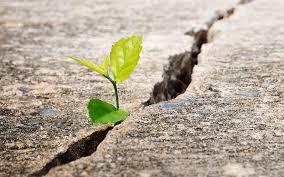 Our imaginations are shattered, “like the crack in everything, that’s how the light gets in.” Revealed again, that every seventh day, this religion in time that is ours, will offer an opportunity for atonement. We need not wait for the Shabbat of Shabbats on Yom Kippur to be unburdened of public sin or private humiliation. We will not require a bazaar or the presence of the prominent to experience surcease from the uncomfortable truth of who we might have been or what we might have done. It is a gift from Hashem that exceeds the opportunity to contribute to the building of a dwelling place or perform the work of expiation. Now we can understand why the Rabbis clarified our rest to exclude any semblance of activity that might recall the efforts required to build the Mishkan. And so, the people and we disperse to our homes. Shabbat Shalom.
Our imaginations are shattered, “like the crack in everything, that’s how the light gets in.” Revealed again, that every seventh day, this religion in time that is ours, will offer an opportunity for atonement. We need not wait for the Shabbat of Shabbats on Yom Kippur to be unburdened of public sin or private humiliation. We will not require a bazaar or the presence of the prominent to experience surcease from the uncomfortable truth of who we might have been or what we might have done. It is a gift from Hashem that exceeds the opportunity to contribute to the building of a dwelling place or perform the work of expiation. Now we can understand why the Rabbis clarified our rest to exclude any semblance of activity that might recall the efforts required to build the Mishkan. And so, the people and we disperse to our homes. Shabbat Shalom.
Community and Heritage
April 2, 2022
Tzav Drash by Alex Golub
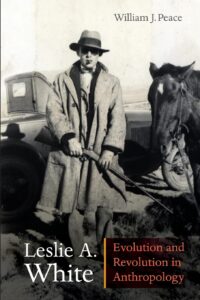
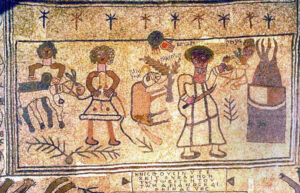
My intellectual grandfather was an socialist atheist from Salida Colorado named Leslie White. He grew up on the farm. Hated it. The minute he turned 18, he ran off and joined the merchant marines. Eventually he found his way to anthropology and got a Ph.D. from the University of Chicago in 1927. For the next 40 years he taught at the University of Michigan. Like many protestants, when he said he was an ‘atheist,’ what he meant was he hated Catholics. His lectures were so anti-Church that nuns were assigned to sit in the front seat and take notes so that they could report back to the bishop. White hated religion, but he loved culture. He passed that love on to his student Marshall Sahlins, who passed it on to me when I became his student. ‘Culture’ was their way of saying that people added an extra layer of meaning on top of the world. My favorite line of White’s was “No ape can appreciate the difference between holy water and distilled water, because there is none, chemically speaking.”
Surprisingly, Rabbi Sacks agrees with the atheist from Salida Colorado. He points out that “We are not simply animals. We have within us immortal longings… we can formulate ideas and be moved by high ideals… Physically, we are almost nothing; spiritually, we are brushed by the wings of eternity.” White and Sacks would disagree about whether or not our cultural capacity comes from God or evolution, but they would agree that this parshah demonstrates the power of human culture. The sacrifices we read about today are all about adding an extra layer of meaning on top of our everyday lives. Some meat is just meat, but meat which is a sin offering is special: it is so holy you have to break the clay pot it was cooked in. Chemically speaking, the two pieces of meat are the same. Culturally speaking, they couldn’t be more different. The cultural logic of these sacrifices elevate them to a work of art.
Some of us might read this parshah and think “Man, all of these sacrifices sounds like a huge pain in the neck. Wouldn’t it be easier to skip them?” No doubt we are not the first to ask this question. Imagine you are an Israelite chief out in the desert, waiting to hear from Aaron and Moses what their new religion was all about. They get done explaining all these different offerings to you and you’re all like: “Wait, there’s a light that can never go out? And then there’s another light that can never go out? We’re going to need how many bulls a day? You’re going to purify yourself for a week before we get this thing started? Bro.” In fact, I often get this response from my students when I explain fasting, davening, not eating pork, and all the other things I do. They can’t understand why someone would follow a religion if it didn’t make them feel good. For them, religion is a retail experience, like ordering a smoothy or picking out scented candles. It’s purpose is to, like, help you feel better, man. To be honest, I think this point of view is pathetic.
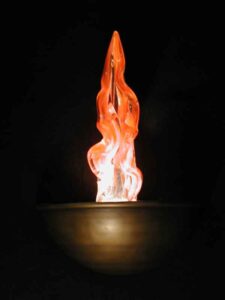 The genius of these sacrifices is how onerous they are. The truth is, if you ask a lot, you get a lot. Quick and easy jobs don’t create communities. They don’t challenge people to grow. They don’t force you to stand up and say “we’re doing this.” It is easy to go through life like Leslie White’s ape, unable to distinguish holy water from tap water. It requires nothing from you. To make a sacrifice, you have to be a person. At Sof today we make smaller sacrifices, like showing up at shul on Saturday or organizing High Holy Days, and these sacrifices are what make our community a work of art. We make them, as John F. Kennedy once said, “not because they are easy, but because they are hard, because [they] … serve to organize and measure the best of our energies and skills, because [their] challenge is one that we are willing to accept, one we are unwilling to postpone, and one which we intend to win.” The systems of sacrifices we read about this week teach us that we can only be truly human when we are also truly Jewish, that fully realizing our potential means having a heritage we must not shirk. Shabbat shalom.
The genius of these sacrifices is how onerous they are. The truth is, if you ask a lot, you get a lot. Quick and easy jobs don’t create communities. They don’t challenge people to grow. They don’t force you to stand up and say “we’re doing this.” It is easy to go through life like Leslie White’s ape, unable to distinguish holy water from tap water. It requires nothing from you. To make a sacrifice, you have to be a person. At Sof today we make smaller sacrifices, like showing up at shul on Saturday or organizing High Holy Days, and these sacrifices are what make our community a work of art. We make them, as John F. Kennedy once said, “not because they are easy, but because they are hard, because [they] … serve to organize and measure the best of our energies and skills, because [their] challenge is one that we are willing to accept, one we are unwilling to postpone, and one which we intend to win.” The systems of sacrifices we read about this week teach us that we can only be truly human when we are also truly Jewish, that fully realizing our potential means having a heritage we must not shirk. Shabbat shalom.
Remember Before We Were Born
March 2, 2022
Mishpatim Drash by Morris Rabinko
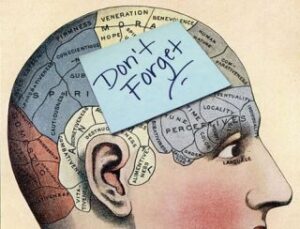

When my two daughters were not quite yet 4 and 7 years old, I overheard them talking from outside their room one day. The older one said to the younger one, “Do you remember when I was younger and you weren’t born yet?” There was a pause and then I heard the response, “Yeahhh.” For years I told that story thinking how cute it was how kids think and see the world. But more recently when I told that story, I heard a still, small voice in the back of my head saying, “Remember that we were slaves in Egypt.” That’s what we read every Passover at the Seder from the Haggadah, “Avadim hayinu b’Mitzrayim.” Isn’t that remembering before we were born? We remember not just that our ancestors were slaves, but that we ourselves were slaves in Egypt.
Does this mean that we should believe that we were physically there? No, that’s not necessary. Memories can be formed not only from personal experience of events that take place in our own lives, but from stories and teachings transmitted to us. Such collective memories help shape and define who we are. Such collective memories that help put our lives into broader context can come from history, philosophy, science. For example, I remember when dinosaurs roamed the earth, although I don’t think I was there. I would even suggest that we have “memories” of events that haven’t happened yet. I “remember” that if I throw a ball, it will arc through the air and I estimate pretty well where it will land. That’s how pitchers pitch strikes. We remember from consequences of our actions in the past, what the outcomes of our actions will be in the future, and can potentially change our behavior to get a different result.
Of course, our memories of the future can be a bit fuzzy – maybe that’s why we don’t call them “memories,” but rather expectations, assumptions, estimates, predictions. But memories of the past can be fuzzy and often false as well. When I had a Zoom call last year with old elementary school friends that I hadn’t seen in over 50 years, we discovered our memories of events often differed. Sharing and comparing our recollections we arrived at what was probably a more accurate understanding of what actually happened. So what is memory? As I’m defining it, it’s everything we’re thinking of right now that isn’t happening right now. One can argue that that is everything we’re thinking now, since what we are seeing right now, actually happened some nanoseconds ago since it takes time for the light signals to travel to the eye and be conveyed and processed by the brain, so even “now” is a memory. But it is clear that all these thoughts – whether we call them memories, predictions, assumptions – make up who we are and provide the context within which we understand the world. It seems to me we have individual memories of events that happen to us, in our lifetime, and we have collective memories that are passed down from generation to generation. And all these memories affect our expectations of the future and help prepare us for what may come.
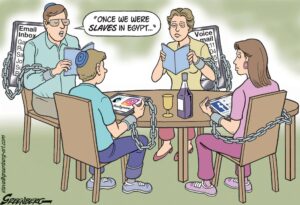 So what does memory have to do with today’s Parshah, Mishpatim? In Mishpatim, as explained in Etz Hayim, the tone of the Torah changes from a narrative with many stories and occasional references to laws or rules, to the very opposite. From here on out, the Torah will be primarily laying out rules and laws with only occasional narrative story-telling. We are now entering what the Torah is really about in the first place – the laws to live by, as people, as a people, and as individuals. Mishpatim, by the way, means laws, or rules. Why here, why now? Why are the laws being laid down at this point in the Torah? Well, would it have made sense to lay down the law in the Garden of Eden? As it is Adam and Eve were given one simple instruction: “Of every tree in the garden you can eat, but you may not eat of the tree of knowledge of good & bad.” And they couldn’t even do that. As I see it, Adam and Even had no memory, no context within which to put even that one command. Being newly created – or newly evolved, that doesn’t change anything – they had no cognitive experience of the world. It was simply a command, with no context, and I suspect they were never supposed to, or expected to, heed that command. I view that in a similar way to HaShem’s warning Israel against having a king, yet then acquiescing and choosing a king. We were given consciousness and free will and needed to start acting and learning from our own experience and from the consequences of our actions.
So what does memory have to do with today’s Parshah, Mishpatim? In Mishpatim, as explained in Etz Hayim, the tone of the Torah changes from a narrative with many stories and occasional references to laws or rules, to the very opposite. From here on out, the Torah will be primarily laying out rules and laws with only occasional narrative story-telling. We are now entering what the Torah is really about in the first place – the laws to live by, as people, as a people, and as individuals. Mishpatim, by the way, means laws, or rules. Why here, why now? Why are the laws being laid down at this point in the Torah? Well, would it have made sense to lay down the law in the Garden of Eden? As it is Adam and Eve were given one simple instruction: “Of every tree in the garden you can eat, but you may not eat of the tree of knowledge of good & bad.” And they couldn’t even do that. As I see it, Adam and Even had no memory, no context within which to put even that one command. Being newly created – or newly evolved, that doesn’t change anything – they had no cognitive experience of the world. It was simply a command, with no context, and I suspect they were never supposed to, or expected to, heed that command. I view that in a similar way to HaShem’s warning Israel against having a king, yet then acquiescing and choosing a king. We were given consciousness and free will and needed to start acting and learning from our own experience and from the consequences of our actions.
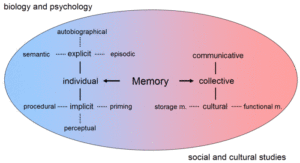 The story of Adam and Eve is followed by stories of Cain & Abel, the Flood, and Sodom and Gomorrah, conveying the negative consequences of behaving as one pleases, while the examples of Noah and Abraham show the rewards of from sacrifice – both literally and figuratively, from giving up or sharing the fruits of one’s labor through actual sacrifice or through delayed gratification – although we learn from Abraham there are limits to what one may sacrifice (a precursor to the Ten Commandments’ “Thou shalt not kill”). We then have the story of Jacob and we see more actions and consequences. If you lie to your father, expect your children to lie to you, as his children did after selling their brother into slavery, and if you sell your brother into slavery, expect “what goes around comes around” and that your descendants will become slaves. From Joseph we learn the rewards of sacrificing the immediate gratification of the years of good harvest in order to provide for the bad years. And finally, we learn of the injustice and hardships of slavery, as well as of the challenges and hardships of freedom.
The story of Adam and Eve is followed by stories of Cain & Abel, the Flood, and Sodom and Gomorrah, conveying the negative consequences of behaving as one pleases, while the examples of Noah and Abraham show the rewards of from sacrifice – both literally and figuratively, from giving up or sharing the fruits of one’s labor through actual sacrifice or through delayed gratification – although we learn from Abraham there are limits to what one may sacrifice (a precursor to the Ten Commandments’ “Thou shalt not kill”). We then have the story of Jacob and we see more actions and consequences. If you lie to your father, expect your children to lie to you, as his children did after selling their brother into slavery, and if you sell your brother into slavery, expect “what goes around comes around” and that your descendants will become slaves. From Joseph we learn the rewards of sacrificing the immediate gratification of the years of good harvest in order to provide for the bad years. And finally, we learn of the injustice and hardships of slavery, as well as of the challenges and hardships of freedom.
It is only after all this history that seeps into our collective consciousness and memory, that the Israelites – and the Torah reader – are ready to accept the laying down of the law. They and we now have a context, a collective memory of the consequences of our actions and are ready and willing to accept the law: na’aseh venishma, “we will do and we will hear” (Ex. 24:7) as the Israelites respond upon receiving the law. So everything up to now in the Torah has been laying the groundwork for what is to follow. And appropriately, fresh from the experience of slavery, the first laws laid down in Mishpatim address slavery. The very first law, in Mishpatim (Exodus 21:2), is: “Should you buy a Hebrew slave, he shall work six years, and in the seventh 2024, he shall go out to freedom without charge.” The narrative is complete and we are now ready to take on the never-ending hard work of coming together as a people, understanding the responsibilities, rewards and punishments of being a chosen people. When you think of it, a lot of wisdom and love went into the Torah and into preserving it and passing it down so that we can remember who we were even before we were born.
Drash for Parashat Va’era (5782 –January 1st 2022)
January 27, 2022
by Malka Michel
The main events of parashat Vayera loom large in the Jewish psyche and I think it fair to say they are fairly well known; the beginning of the ten plagues, God hardening Pharaoh’s heart, the seemingly endless negotiations between Moses, Aaron and Pharaoh, etc. So, on this Shabbat I want to focus on something a little off-the-beaten-derech, the path, as it were. This parasha picks up after the cliff-hanger that ended last week’s, in which God says to Moshe: עתה תראה אשר אעשה לפרעה כי ביד חזקה ישלחם וביד חזקה יגרשם מארצו –now, you’re going to see exactly what I’m going to do to Pharaoh, that with a strong hand he will send b’nei Yisrael forth and with a strong hand he will drive them out from his land.
One might expect, then, that the opening of this parasha would return to the unfolding of the Exodus story so we (the audience) can see how God makes good on these promises. That, however, is not what Torah does. The opening line of parashat Va’era reads: וידבר אלו” אל משה ויאמר אליו אני יי. God spoke to Moses and said: I am yod-hey-vav-hey. Turns out this is the beginning of a mini monologue in which God reminds Moshe about how God made the brit with Avraham, then with Yitzhak and subsequently with Ya’akov, and an integral part of that brit (the covenant) is the land of Israel. This mini-logue ends with God saying: ונתתי אתה לכם מורשה אני יי , and I gave this land (of Israel) to you (the Israelites) as an inheritance. I am yod-hey-vav-hey.
Now, keep that repetition in mind –because there is always a reason for it –and I want to draw your attention to something that, while the verses I’m about to cite may be a little less familiar, I argue this is the most salient point in all of Torah. In fact, one could argue in all of Tanakh, really. לֹא־תֵלֵ֤ךְ רָכִיל֙ בְּעַמֶּ֔יךָ לֹ֥א תַעֲמֹ֖ד עַל־דַּ֣ם רֵעֶ֑ךָ אֲנִ֖י יי Do not go amongst your people slandering, and do not profit from the blood of your fellow, I am yod-hey-vav-hey. That was Leviticus 19:16, and just two verses later in 19:18, we have לֹֽא־תִקֹּ֤ם וְלֹֽא־תִטֹּר֙ אֶת־בְּנֵ֣י עַמֶּ֔ךָ וְאָֽהַבְתָּ֥ לְרֵעֲךָ֖ כָּמ֑וֹךָ אֲנִ֖י יי you will not take vengeance, nor will you bear a grudge against your fellow Israelites. Love your fellow as yourself. I am yod-hey-vav-hey. Back in verse 14 Torah states: לֹא־תְקַלֵּ֣ל חֵרֵ֔שׁ וְלִפְנֵ֣י עִוֵּ֔ר לֹ֥א תִתֵּ֖ן מִכְשֹׁ֑ל וְיָרֵ֥אתָ מֵּאֱלֹהֶ֖יךָ אֲנִ֥י יי do not curse a deaf person, and do not put an obstacle before a blind person. Revere your God, I am yod-hey-vav-hey. I think you’re starting to get the point; the phrase אני יי repeats itself in all of these cases.
Why is this so important? Well, it has to do with what my teacher, the illustrious Rabbi Elliot Dorff, calls the Torah’s definition of idolatry. This is from Deuteronomy 8:17 saying thusly: וְאָמַרְתָּ֖ בִּלְבָבֶ֑ךָ כֹּחִי֙ וְעֹ֣צֶם יָדִ֔י עָ֥שָׂה לִ֖י אֶת־הַחַ֥יִל הַזֶּֽה
And you will say to yourself, it was my might and the strength of my hand that brought about this wonder. In other words, it is idolatry to think that God has nothing to do with our success –that progress is brought about solely because of human capacity. This is hubris, it is arrogance, and it is perilous for us as humans. After all, if it wasn’t Torah would never have stated as it does.
At present, we are walking a dangerous path in our society. There are too many voices that scream from the rotting pedestals of an Enlightenment that soured more than a generation ago that science –science alone is the way of the future. That in order to be a rational, intelligent person we need to give up this foolish notion of God. God is a myth and bedtime story for children so they won’t be afraid of the dark. And I say no. No. a concept of God may be outdated –even toxic –but a concept of God is not the same thing as the reality. The more one conflates the forest with the trees, so to speak, the more human development is hampered.
Now, to be perfectly clear, I am not anti-science. Science (and Western medicine for that matter) is part of the modern world and it should play a role in our lives, but not to the exclusion of everything else. Now, you may be thinking, ‘c’mon Malka, we as Jews have known for literal centuries that science and religion go hand in hand. You are flipping out over nothing.’ Yes, Jews have always known that there is no quarrel between science and religion. But we as Diasporic Jews live in a Western society, and Western society at large is very, very different from Jewish culture and a Jewish view of life.
There are too many voices in the predominating culture crying out that the only way to move forward is to eradicate viruses and disease from our midst completely. First of all, that is impossible –it is truly impossible –and second, the unspoken assumption behind that idea is that science is the one salvation against the travails and miseries of life. Jewish tradition, on the other hand, talks about a coming cessation of suffering, war and disease, but that has nothing to do with science. It is because of the coming of mashiah and a radical shift in the human consciousness.
In the face of death our current Western culture quails and weeps because death is not seen as a transition to a new form of existence or natural part of life, it is a gaping void –a punishment from which one cannot be released.
And why does Torah repeat and repeat the phrase אני יי? To caution us against falling into the trap of mental idolatry. The trap of thinking that anything other than God is the ultimate source of our success and salvation. This is the most salient point of all Tanakh.
Yes, we can, and we should use science to better our lives, but when we place so much power in a field that changes and vacillates with enough speed to make one’s head spin that is doing precisely what Torah adjures us not to do. And let me remind you that it was not someone in a white lab coat who orchestrated our Exodus –that was God. And God cannot bring us out of Egypt, from slavery to freedom, unless we acknowledge that God is the source of our Exodus.
Just as we took many paths through the wilderness until finally reaching the Promised Land, our way forward from the narrowness of the last two years does not come in one form only. In fact, when we focus so myopically and obsessively on there being one and only one solution, that cuts us off from other possibilities that are equally viable, if perhaps less trendy. Friends, if we wish to live in a world where plurality and diversity is celebrated, it starts here. Now.
So let us move forward, into a new Gregorian year, into the rest of 5782 being aware that rigidity of thought is something we must become aware of, and when we do, that is the opening and the beginning of truly positive change and a beautiful relationship with the Source of all life. Shabbat shalom.
Revolutionary Prophet & Manager:
Moshe, Yosef, and Parshah Shemot
January 1, 2022
Drash by Reb Daniel Lev
 As we journey through the parshiot we can recall that we just left the end of Joseph’s story and are about to enter the world of Moshe and the Children of Israel. What could the life of Moses teach us about being Jewish (or according to his day, “Israelitish”)? What would happen if we compared him to Joseph, also called Yosef? We might see two models of Jewish leadership.
As we journey through the parshiot we can recall that we just left the end of Joseph’s story and are about to enter the world of Moshe and the Children of Israel. What could the life of Moses teach us about being Jewish (or according to his day, “Israelitish”)? What would happen if we compared him to Joseph, also called Yosef? We might see two models of Jewish leadership.
Let’s look at the differences between Moshe and Yosef along five dimensions: (i) humility, (ii) relationship with G-d and the world, (iii) the leadership role each took in their lives, (iv) Jewish identity as reflected in the level of Jewish tradition they followed, at least Biblical or tribal tradition, and (v) how each served the Jewish people.
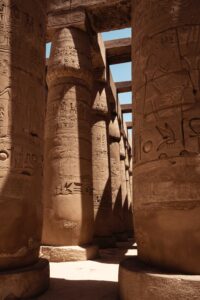 Moshe and Yosef unquestionably differ on the dimension of humility. At least earlier in his life, Yosef notably exuded a good deal of ego. Recall him telling his family that one day they would bow before him. Although they were prophetic dreams, he probably should not have rubbed it in their faces. On the other hand, how could he have been positioned as the second in command of all Egypt if his annoyed brothers hadn’t moved him towards slavery? As we know, everything connects in the Torah.
Moshe and Yosef unquestionably differ on the dimension of humility. At least earlier in his life, Yosef notably exuded a good deal of ego. Recall him telling his family that one day they would bow before him. Although they were prophetic dreams, he probably should not have rubbed it in their faces. On the other hand, how could he have been positioned as the second in command of all Egypt if his annoyed brothers hadn’t moved him towards slavery? As we know, everything connects in the Torah.
And Moshe? We’re aware that he was famously known for his overabundance of humility. For example, remember the burning bush incident where HaShem eventually invited Moshe to free the Jewish people from Egypt? The first words out of Moshe’s mouth were, “Who am I that I should go to Pharaoh and that I should bring out the Children of Israel out of Egypt?” He’s saying–“I’m just a little pisher” (as my mother would say). Recall also that he was also very concerned with his ability to speak and for a while he needed Aaron to serve as his mouthpiece. Moshe’s relationship with G-d is legendary: Not only did he hold mutual conversations directly with HaShem, but he did it, panim el panim, Face to face. As it later says in Exodus 33:11, “And HaShem spoke to Moses face-to-face, as a man speaks to his friend….” You could say that, in a way, HaShem and Moshe were “buds.” Perhaps due to this close relationship, Moshe didn’t have to figure out what G-d wanted him to do, HaShem just told him and Moshe carried it out. He didn’t have to feel concerned about bargaining with the world around him, he’d simply see injustice and stand up against it.
 When we look at the stories of the Holy mothers and fathers who founded and expanded our tribe we see that most of them spoke and related directly with G-d. We find this in Abraham, Isaac, Rebecca and Jacob…but not Yosef. Zo, how did G-d communicate with him? The Divine Presence presented dreams and dream interpretations. In Joseph’s story it never said, “And G-d spoke, saying…” Instead, Yosef would attribute his interpretations to the Creator. In a sense, you could say that G-d was not directly telling him what to do, the Holy One may have left it up to Yosef to make his way in the world. Perhaps, that is also what being sold into slavery taught him.
When we look at the stories of the Holy mothers and fathers who founded and expanded our tribe we see that most of them spoke and related directly with G-d. We find this in Abraham, Isaac, Rebecca and Jacob…but not Yosef. Zo, how did G-d communicate with him? The Divine Presence presented dreams and dream interpretations. In Joseph’s story it never said, “And G-d spoke, saying…” Instead, Yosef would attribute his interpretations to the Creator. In a sense, you could say that G-d was not directly telling him what to do, the Holy One may have left it up to Yosef to make his way in the world. Perhaps, that is also what being sold into slavery taught him.
Yosef was recognized for his pragmatic and social communication abilities beginning in Genesis 40:14: the story of the butler and the baker who each had a troubling dream. Yosef was in prison with both of them and he interpreted their dreams, predicting that the butler would live and soon be returned to his job serving the Pharaoh. Then, in Gen 40:14, Yosef says to the butler: “Remember me when things go well with you and please do me a kindness and mention me to the Pharaoh and bring me out of this place.” Yosef does not ask G-d to free him, he asks an Egyptian house-servant. As we’ll see, Yosef could take care of business but, according to some of our rabbis, he should have asked G-d: As the story turns out, the butler forgot him for two years. These rabbis attributed that to the necessity of Yosef spending two more years in jail in order to develop a closer connection with G-d.
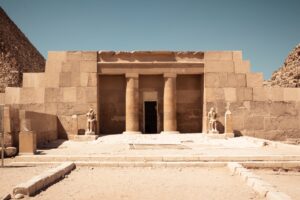 What leadership role did each take in their lives? Simply said: Yosef was a manager, administrator and a bit of a bureaucrat while Moshe was a revolutionary prophet, mass movement leader and judge. Looking at some of Yosef’s stories you can see how he was recognized by others for his managerial skills, starting with the story of Potiphar, Yosef’s first master in Egypt. In Genesis 39:4 it says: “And Yosef found favor in his sight, and he ministered to him. And [Potiphar] appointed him [as an overseer] over his house, and all that he had – he put in his hand.” After Yosef was imprisoned, the jail keeper became dazzled by Yosef’s apparent administrative and social abilities and Genesis 39:22 says that the keeper, “Committed into Yosef’s hand all the prisoners that were in the prison.” Many of us know that Yosef’s most challenging corporate position came once he was brought out of prison and stood before the Pharaoh to interpret his dreams.
What leadership role did each take in their lives? Simply said: Yosef was a manager, administrator and a bit of a bureaucrat while Moshe was a revolutionary prophet, mass movement leader and judge. Looking at some of Yosef’s stories you can see how he was recognized by others for his managerial skills, starting with the story of Potiphar, Yosef’s first master in Egypt. In Genesis 39:4 it says: “And Yosef found favor in his sight, and he ministered to him. And [Potiphar] appointed him [as an overseer] over his house, and all that he had – he put in his hand.” After Yosef was imprisoned, the jail keeper became dazzled by Yosef’s apparent administrative and social abilities and Genesis 39:22 says that the keeper, “Committed into Yosef’s hand all the prisoners that were in the prison.” Many of us know that Yosef’s most challenging corporate position came once he was brought out of prison and stood before the Pharaoh to interpret his dreams.
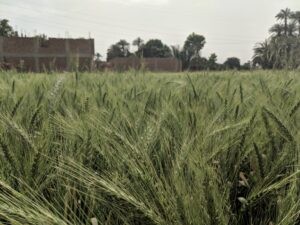 Even though he attributed his interpretations to G-d, Yosef again took care of business without asking for HaShem’s aid. We see this at the end of his interpreting Pharaoh’s dreams when he managed to add a little job recommendation for himself by suggesting in Genesis 41:33, “Let Pharaoh look for a discerning and wise man and set him over the land of Egypt…” Yosef then mapped out the policy this wise man should follow to insure the survival of Egypt. So, Pharaoh took the hint and hired Yosef, saying in Genesis 39-41, “See I have set you over all the land of Egypt.” Yosef was well suited for this job. After seven years of plenty during which he stored up years of provisions, he was able to feed the Egyptian people and in exchange he filled the coffers of the Egyptian government with money, cattle, land and eventually the servitude of the country’s population. The way he set up that last acquisition was to establish a kind of share-cropping system. Again, Joseph was an expert at creating and administering social policy.
Even though he attributed his interpretations to G-d, Yosef again took care of business without asking for HaShem’s aid. We see this at the end of his interpreting Pharaoh’s dreams when he managed to add a little job recommendation for himself by suggesting in Genesis 41:33, “Let Pharaoh look for a discerning and wise man and set him over the land of Egypt…” Yosef then mapped out the policy this wise man should follow to insure the survival of Egypt. So, Pharaoh took the hint and hired Yosef, saying in Genesis 39-41, “See I have set you over all the land of Egypt.” Yosef was well suited for this job. After seven years of plenty during which he stored up years of provisions, he was able to feed the Egyptian people and in exchange he filled the coffers of the Egyptian government with money, cattle, land and eventually the servitude of the country’s population. The way he set up that last acquisition was to establish a kind of share-cropping system. Again, Joseph was an expert at creating and administering social policy.
 Moshe, on the other hand, was not a great administrator (he left a lot of that up to Aaron). I mean, for example, he had to wait until his father-in-law Yitro suggested that he set up a system of judges so Moshe would not have to sit for hours on end judging large and small cases! However, as a revolutionary prophet, he directly wielded the righteous power of the Divine Will to tolerate no injustice and free his people while, at the same time using the plagues G-d provided in order to bring down the Egyptian power structure. He showed this spirit of justice and direct action early on when he killed the Egyptian taskmaster who was beating Jewish slaves and later when he when he drove away shepherds who were preventing his future father-in-law’s daughter from watering their sheep. Filled with righteous indignation, Moshe stepped up to change unjust social situations.
Moshe, on the other hand, was not a great administrator (he left a lot of that up to Aaron). I mean, for example, he had to wait until his father-in-law Yitro suggested that he set up a system of judges so Moshe would not have to sit for hours on end judging large and small cases! However, as a revolutionary prophet, he directly wielded the righteous power of the Divine Will to tolerate no injustice and free his people while, at the same time using the plagues G-d provided in order to bring down the Egyptian power structure. He showed this spirit of justice and direct action early on when he killed the Egyptian taskmaster who was beating Jewish slaves and later when he when he drove away shepherds who were preventing his future father-in-law’s daughter from watering their sheep. Filled with righteous indignation, Moshe stepped up to change unjust social situations.
What was their Jewish identity as reflected in the level of Jewish tradition they followed at the time? Obviously, Moshe was quite connected even to the point of carrying out the unfamiliar but newly acquired guidance system of Jewishness called “The Torah.” Although, ironically, he was apparently raised from adolescence on as an Egyptian aristocrat, he left that world behind. Yosef, on the other hand, was different. In order to run the country of Egypt he had to assimilate to some degree. He accepted the Egyptian, goyish name given him by Pharaoh and a brand new Egyptian wife, Asenath, with whom he intermarried. Moshe intermarried also but apparently Tzipora the Midianite was aligned enough with our tradition to make sure her sons were circumcised. In Yosef’s case, it may have made sense for him to look and act like an Egyptian in order to work within the bureaucracy of Egypt and gain the respect of the Pharaoh and the Egyptian people. Moshe had no need to do that as he was in the process of freeing his brothers and sisters from Egypt and building a new Jewish nation.
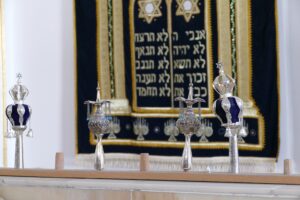 This brings me to the last dimension: How did each of these leaders serve the Jewish people? As far as I can tell, Yosef’s major contribution was physical survival. From his position of power, he was able to bring his large family into Egypt where the food was. I also imagine that under his boss, the Pharaoh, the Jews were afforded protection from other enemies. Of course, later, a new set of Pharaoh’s came to power that enslaved us. And Moshe? He not only worked with HaShem to bring us out of the narrows that was life in Egypt, but he helped manifest the Torah which, again, transformed us by providing a common spiritual and cultural way of being. Like any good revolutionary activist he had a vision for us that transcended momentary needs and considered our future generations. Under Moshe we began the process of becoming B’nei Yisrael, the Children of Israel…the Jewish people.
This brings me to the last dimension: How did each of these leaders serve the Jewish people? As far as I can tell, Yosef’s major contribution was physical survival. From his position of power, he was able to bring his large family into Egypt where the food was. I also imagine that under his boss, the Pharaoh, the Jews were afforded protection from other enemies. Of course, later, a new set of Pharaoh’s came to power that enslaved us. And Moshe? He not only worked with HaShem to bring us out of the narrows that was life in Egypt, but he helped manifest the Torah which, again, transformed us by providing a common spiritual and cultural way of being. Like any good revolutionary activist he had a vision for us that transcended momentary needs and considered our future generations. Under Moshe we began the process of becoming B’nei Yisrael, the Children of Israel…the Jewish people.
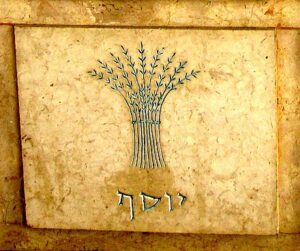 So, here we have two models of Jewish leadership: The one based on Yosef, has had a number of guises over the centuries including Jewish advisors to kings and presidents and, later, modern Jewish communal leaders who through their roles in business, science and professions used the existing social systems to protect our people. Many of these leaders were assimilated into the dominant culture but did their best to make sure physically, culturally and sometimes spiritually we survived. An example of this are some of the well organized groups who helped to resettle oppressed Jews in the United States and in other safe countries during and after WWII. However, our physical survival was not enough for Moshe. He knew that even if we were living as equal citizens in Egypt we would no longer have existed as the Jewish people. Moshe wanted us to be aligned with our tribal ways and HaShem through the path of Torah. A modern example from the last century are revolutionaries such as David Ben Gurion and many in the Zionist movement who labored to not only establish us as a unified nation but also to build a new Jewish culture and home in Israel. They did what they could to settle as many Jews as they could in the Holy Land. And in the fighting spirit of Moshe, they also sent people from British Palestine into Europe to help organize and fight the Nazis as partisans. So there we are: Moshe and Yosef, idealist social activist and pragmatic administrator, two methods of Jewish leadership in the world, both dedicated to working for our betterment. I bless us all that we choose the path that works best for each of us and that together we may be able to help not only our people, but all people through the present plague, economic crisis and environmental deluge that we face. May we all be part of the effort to build a healthier and more collaborative world.
So, here we have two models of Jewish leadership: The one based on Yosef, has had a number of guises over the centuries including Jewish advisors to kings and presidents and, later, modern Jewish communal leaders who through their roles in business, science and professions used the existing social systems to protect our people. Many of these leaders were assimilated into the dominant culture but did their best to make sure physically, culturally and sometimes spiritually we survived. An example of this are some of the well organized groups who helped to resettle oppressed Jews in the United States and in other safe countries during and after WWII. However, our physical survival was not enough for Moshe. He knew that even if we were living as equal citizens in Egypt we would no longer have existed as the Jewish people. Moshe wanted us to be aligned with our tribal ways and HaShem through the path of Torah. A modern example from the last century are revolutionaries such as David Ben Gurion and many in the Zionist movement who labored to not only establish us as a unified nation but also to build a new Jewish culture and home in Israel. They did what they could to settle as many Jews as they could in the Holy Land. And in the fighting spirit of Moshe, they also sent people from British Palestine into Europe to help organize and fight the Nazis as partisans. So there we are: Moshe and Yosef, idealist social activist and pragmatic administrator, two methods of Jewish leadership in the world, both dedicated to working for our betterment. I bless us all that we choose the path that works best for each of us and that together we may be able to help not only our people, but all people through the present plague, economic crisis and environmental deluge that we face. May we all be part of the effort to build a healthier and more collaborative world.
Teshuvah Gemurah
Judah’s Repentance in Parsha Vayigash
January 1, 2022
Drash by Donald Armstrong
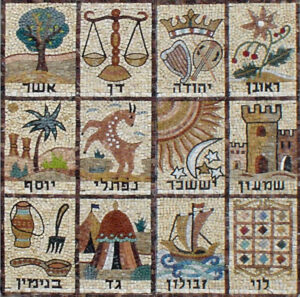 The Joseph story is the longest unbroken narrative in the Torah. Rabbi Jonathan Sacks wrote a series of Vayigash drashes between 2013 and 2016 that focused on Joseph and his older brother Judah. The Joseph story is the first demonstration of teshuvah in the Torah: Judah’s acknowledgement of his guilt, his remorse, his confession of sin, and his changed behavior; as well as Joseph’s forgiveness of Judah and his brothers. Rabbi Sacks notes that Joseph, the favorite son of Jacob, is the archetypal leader destined for greatness. In sharp contrast, Judah is the least likely candidate for leadership and moral greatness—he even proposed selling his father’s favorite son Joseph into slavery. Judah then undergoes a series of major life events and mishaps: he separates from his brothers, lives with the Canaanites, intermarries with a Canaanite woman, and loses two sons because of sin. He then impregnates a woman who he thinks is a prostitute. It turns out that this woman is his widowed daughter-in-law Tamar, determined to continue the family line by any means necessary. When Tamar does not publicly shame him for his bad behavior, Judah admits that he was wrong, saying, “She was more righteous than I.” This is the first admission of guilt in the Torah. Rabbi Sacks points out that Joseph’s progeny, the tribes of Ephraim and Mannaseh, disappear from Jewish history after the Assyrian conquest in 772 BCE, while Judah’s progeny, starting with King David, become kings of Israel. The tribe of Judah survives the Babylonian conquest and today we are known as the Yehudim, the Jews. How can this be when Joseph is the hero of his story? This historic reversal illustrates the Talmudic principle that, “Where penitents stand, even the perfectly righteous cannot stand.” While Joseph is known as ha-tzaddik, the righteous one, Judah is known as ish teshuvah, a man of penitence.
The Joseph story is the longest unbroken narrative in the Torah. Rabbi Jonathan Sacks wrote a series of Vayigash drashes between 2013 and 2016 that focused on Joseph and his older brother Judah. The Joseph story is the first demonstration of teshuvah in the Torah: Judah’s acknowledgement of his guilt, his remorse, his confession of sin, and his changed behavior; as well as Joseph’s forgiveness of Judah and his brothers. Rabbi Sacks notes that Joseph, the favorite son of Jacob, is the archetypal leader destined for greatness. In sharp contrast, Judah is the least likely candidate for leadership and moral greatness—he even proposed selling his father’s favorite son Joseph into slavery. Judah then undergoes a series of major life events and mishaps: he separates from his brothers, lives with the Canaanites, intermarries with a Canaanite woman, and loses two sons because of sin. He then impregnates a woman who he thinks is a prostitute. It turns out that this woman is his widowed daughter-in-law Tamar, determined to continue the family line by any means necessary. When Tamar does not publicly shame him for his bad behavior, Judah admits that he was wrong, saying, “She was more righteous than I.” This is the first admission of guilt in the Torah. Rabbi Sacks points out that Joseph’s progeny, the tribes of Ephraim and Mannaseh, disappear from Jewish history after the Assyrian conquest in 772 BCE, while Judah’s progeny, starting with King David, become kings of Israel. The tribe of Judah survives the Babylonian conquest and today we are known as the Yehudim, the Jews. How can this be when Joseph is the hero of his story? This historic reversal illustrates the Talmudic principle that, “Where penitents stand, even the perfectly righteous cannot stand.” While Joseph is known as ha-tzaddik, the righteous one, Judah is known as ish teshuvah, a man of penitence.
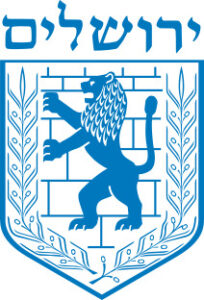 Although Joseph becomes the Viceroy, second in command only to Pharaoh, Judah becomes the father of Israel’s kings. Even the perfectly righteous Joseph cannot stand with Judah, because Judah has shown greater moral growth and penitence. We now can see the significance of Judah’s name, which derives from the Hebrew verb lehodot. This verb means two things: (1) “to thank,” which is what Leah had in mind when she named Judah, (“I thank the Lord”), and (2) “to admit or acknowledge.” The biblical term vidui, confession, comes from the same root. Thus the name Judah also means “he who acknowledged his sin.”
Although Joseph becomes the Viceroy, second in command only to Pharaoh, Judah becomes the father of Israel’s kings. Even the perfectly righteous Joseph cannot stand with Judah, because Judah has shown greater moral growth and penitence. We now can see the significance of Judah’s name, which derives from the Hebrew verb lehodot. This verb means two things: (1) “to thank,” which is what Leah had in mind when she named Judah, (“I thank the Lord”), and (2) “to admit or acknowledge.” The biblical term vidui, confession, comes from the same root. Thus the name Judah also means “he who acknowledged his sin.”
When Joseph, concealed by his position as the Egyptian Viceroy, insisted that the brothers bring their youngest brother Benjamin to Egypt, their father Jacob refused. He had already lost his beloved son Joseph; he would not risk losing Benjamin too. When Judah guaranteed Benjamin’s safety to Jacob, he agreed to let Benjamin go back with them to Egypt. But a nightmare scenario unfolded: as they left Egypt to return to their father, the Viceroy’s silver cup was found in Benjamin’s possession. The Viceroy delivered his verdict: Benjamin would be enslaved while the other brothers were free to go home. Judah then tells the Viceroy of the grief that Rachel and Jacob suffered over the loss of their youngest son Joseph; Judah fears that if they also lose Benjamin, they will die of grief. Judah pleads to replace Benjamin with himself as the Viceroy’s slave. Thus Judah is the first person in the Torah to achieve perfect repentance, teshuvah gemurah—that is, he finds himself in a situation to repeat an earlier sin but does not do so because he is now a changed person. Overcome with emotion by Judah’s offer, Joseph reveals himself to his brothers and forgives them. This is the first recorded moment in history in which one human being forgives another.
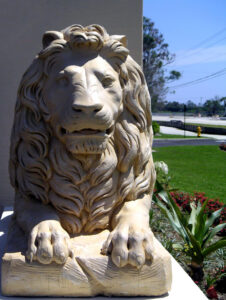 Thus Judaism begets a new form of morality. Judaism primarily develops as an ethic of guilt, as opposed to most other systems that are ethics of shame and honor. One of the fundamental differences between them is that shame attaches to the person; guilt attaches to the act. In shame cultures, when a person does wrong he or she is stained, marked, or defiled. In guilt cultures, what is wrong is not the doer but the deed, not the sinner but the sin. The person retains his or her fundamental worth—as we say in our prayers, “the soul you gave me is pure.” It is the bad acts that have to be put right. That is why in guilt cultures there are processes of repentance, atonement and forgiveness. In contrast, shame cultures use appeasement, rationalization and exculpation as the means to restore the aggrieved party’s honor and thereby mitigate their retribution and revenge.
Thus Judaism begets a new form of morality. Judaism primarily develops as an ethic of guilt, as opposed to most other systems that are ethics of shame and honor. One of the fundamental differences between them is that shame attaches to the person; guilt attaches to the act. In shame cultures, when a person does wrong he or she is stained, marked, or defiled. In guilt cultures, what is wrong is not the doer but the deed, not the sinner but the sin. The person retains his or her fundamental worth—as we say in our prayers, “the soul you gave me is pure.” It is the bad acts that have to be put right. That is why in guilt cultures there are processes of repentance, atonement and forgiveness. In contrast, shame cultures use appeasement, rationalization and exculpation as the means to restore the aggrieved party’s honor and thereby mitigate their retribution and revenge.
Joseph is able to forgive Judah and his brothers because they, led by Judah, have gone through all four stages of repentance: (1) admission of guilt, (2) confession, (3) atonement, and (4) behavioral change. Forgiveness can only exist in a culture in which repentance exists. Repentance presupposes that we are free and morally responsible beings who are capable of change, i.e., the change that comes about when we recognize that something we have done is wrong, we are responsible for it, we must repair the damage to the extent we can and we must never do it again. The possibility of this kind of moral transformation simply did not exist in Ancient Greece or in related pagan cultures. Ancient Greece was a shame-and-honor culture that turned on the twin concepts of character and fate. Judaism is a repentance-and-forgiveness culture whose central concepts are free will and personal choice. Repentance and forgiveness transformed the human condition. For the first time, repentance established the possibility that we are not condemned to endlessly repeat the past. When I repent I show I can change. The future is not predestined. Forgiveness liberates us from the past and breaks the vicious cycle of hurt reactions and endless retaliations and revenge. Forgiveness provides the means to undo what has been done. Humanity changed the day Joseph forgave his brothers. I pray that we liberate our souls as we forgive and are forgiven for our transgressions.
Parashah Vayeitzei
December 1, 2021
by Robert Littman
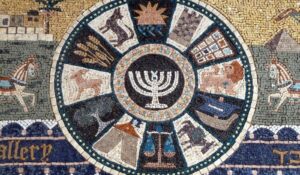
Parshat Vayeitze continues the story of Jacob. The Hebrew Bible is a sacred history of the Jewish people. It is a history since it relates the foundation and formation of the Hebrew people, beginning with Abraham. It is sacred because it is the story of the encounter of the Hebrews with God, who is an actor and a force in the narrative account. This sacred history related in the Bible spans 1500 years, from the middle of the second millennium BCE to the 2nd century BCE. The Hebrew Bible is divided into three sections, the Pentateuch (Torah or Five Books of Moses), the Prophets (Neviim) and the Writings (Ketuvim or Hagiographa). We Jews use an acrostic of the first letter and call the three sections together Tanach. The story of Moses and the Exodus is contained in the first part of the Hebrew Bible, the Five Books of Moses, also known as the Torah or the Pentateuch. These three sections tell the story of the Hebrew people from the first Hebrew, Abraham, sometime in the second millennium BCE down to the end of the second century BCE. After a preface that describes the creation of the world, mankind and the flood, the Pentateuch begins the story of the founder of the Hebrew people, Abraham, and ends with the death of Moses. Five books comprise the Pentateuch, all taking their English names from the Septuagint, the Greek translation of the Bible, made by Jews in Alexandria Egypt in the 3rd to 2nd centuries BCE. These are Genesis, Exodus, Leviticus, Numbers and Deuteronomy. The next section, Neviʻim or Prophets, tells the story of the conquest of Israel by Joshua through the foundation of the Kingdom of Israel and dynasty of King David through the destruction of the kingdom at the hands of the Babylonians, their deportation to Babylon and their return under the Persians at the end of the sixth century BCE. The last section, Writings, composed between the 5th century BCE and the 2nd century BCE, consists of several historical books, including Ezra-Nehemiah and Chronicles, which take the story of the Hebrews through the 5th century BCE. Also included in this section are poetic writings and other quasi-historical books including the Book of Ruth and the Book of Daniel.
This history is that of a tribe, a group of kin who are related through a common male descent, extending back to Abraham. The organization of the kinship group is patrilineal, descent from a common male ancestor. Jacob has 12 children who become the founders of the 12 tribes of Israel. Every Israelite could then trace his origins back to one of the sons of Jacob and back through that to Abraham. The story continues that Jacob eventually goes down to Egypt to join his son Joseph there, and then the Israelites return to Israel under the leadership of Moses. The story is one of a mixed multitude, with intermarriage between the Israelites and Canaanites.
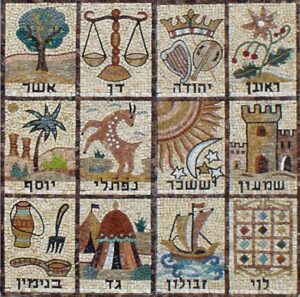 If we compare this sacred history to what we have learned from archaeology and the decipherment of texts from the Babylonians, Persians, Egyptians and other Near Eastern peoples, we find that the Israelites form as an independent group in the 13th century BCE in the hill country. They intermarry with the local Canaanite population, and by 1000 BCE had formed an independent country under King David. Ancient DNA studies are revolutionizing our understanding of the Levant. The Philistines arrived as immigrants / conquerors in the Levant, in the 12th century BCE, as part of the wave of Sea Peoples, who were Greek. Recently DNA extracted from 10 individuals at Ashkelon, buried during the Bronze Age, confirmed that the Philistines migrated from Southern Europe. Moreover, the DNA studies revealed that within a few hundred years, the invaders had so integrated with the native population that their DNA was indistinguishable. I am currently working on a DNA project with burials from Israel that may reveal Israelite origins and may prove or disprove the biblical narrative. Whatever the real history behind the story of Jacob, kinship is either hereditary or adoptive. All kinship groups adopt individuals. So, whatever the DNA, we all remain descendants of Abraham, Isaac and Jacob.
If we compare this sacred history to what we have learned from archaeology and the decipherment of texts from the Babylonians, Persians, Egyptians and other Near Eastern peoples, we find that the Israelites form as an independent group in the 13th century BCE in the hill country. They intermarry with the local Canaanite population, and by 1000 BCE had formed an independent country under King David. Ancient DNA studies are revolutionizing our understanding of the Levant. The Philistines arrived as immigrants / conquerors in the Levant, in the 12th century BCE, as part of the wave of Sea Peoples, who were Greek. Recently DNA extracted from 10 individuals at Ashkelon, buried during the Bronze Age, confirmed that the Philistines migrated from Southern Europe. Moreover, the DNA studies revealed that within a few hundred years, the invaders had so integrated with the native population that their DNA was indistinguishable. I am currently working on a DNA project with burials from Israel that may reveal Israelite origins and may prove or disprove the biblical narrative. Whatever the real history behind the story of Jacob, kinship is either hereditary or adoptive. All kinship groups adopt individuals. So, whatever the DNA, we all remain descendants of Abraham, Isaac and Jacob.
Our Lives are Brilliant with Torah: Drash on Chayei Sarah
December 1, 2021
by Sandra Z. Armstrong
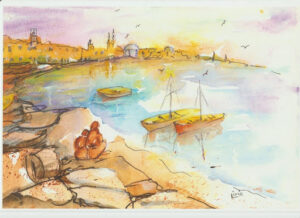 The end of Sarah’s life is described in poetic beauty. Biblical Hebrew reflects the melodic pulse of a human being. Our lives are a moving symphony, put to music they are a beautiful path of curves, weaving in and out of our existence. Like the waves in the Pacific Ocean that surround us, we gently go along pulling back and rolling out to make the best of who we were meant to be. In Genesis 23:1 the span of Sarah’s life came to one hundred and twenty-seven years. Our present lives are influenced by those who came before us. Their DNA is part of who we are, and we move through life with the patterns and imprints that they gave us as a treasure to unfold.
The end of Sarah’s life is described in poetic beauty. Biblical Hebrew reflects the melodic pulse of a human being. Our lives are a moving symphony, put to music they are a beautiful path of curves, weaving in and out of our existence. Like the waves in the Pacific Ocean that surround us, we gently go along pulling back and rolling out to make the best of who we were meant to be. In Genesis 23:1 the span of Sarah’s life came to one hundred and twenty-seven years. Our present lives are influenced by those who came before us. Their DNA is part of who we are, and we move through life with the patterns and imprints that they gave us as a treasure to unfold.
My namesake is Chayei Sarah Malka. I was named after my great grandmother who I heard a lot about but never knew personally. She was known as a woman of valor as she went door to door collecting money for her shul and the needs of her community in Brooklyn, New York. For the Jewish people, our forefathers and mothers brought us an incredible gift of Torah through HaShem. When we study Biblical Hebrew, learning new words and expressions, we deepen our connection to ancient people who just happen to be our mishpucha, our family. When we study our Torah readings and read between the lines of the Biblical prose, we find beauty and direction in our own lives. It is little wonder why we come together to celebrate Shabbat each week or why we strive to come into this shul in person for a minyan each week. It is little wonder why we combine into a hybrid service engaging with our friends who cannot come to shul, at this time, to be with us physically. It is because we are one in the same. We are one community mixed with our Zoom friends.
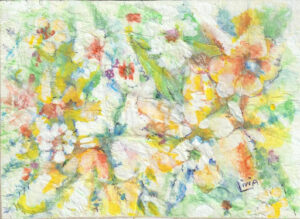 The commitment to be part of a Jewish life weekly is as strong for some of us as the pull of the ocean tides. When we get knocked over, who is there to pick us up in life, to nurture us, to point us in a positive direction? To care for our feelings and to love us? Not just one person in this Sof community to love us but many people to show this level of commitment, trust, friendship, and care. Our triumphs are shared equally as well. We at Sof Ma’arav have been together for 50 years. It is quite incredible that as a community we have been able to ride on top, keeping steady. There is no secret to Sof except one. We maintain our allegiance to the Jewish people and to each other by opening up our Torah, reading weekly, and studying the lessons that currently apply to our lives. Many of us read commentaries and learn from Lord Rabbi Jonathan Sacks, may he rest in peace. We maintain a beautiful equilibrium and stay steady.
The commitment to be part of a Jewish life weekly is as strong for some of us as the pull of the ocean tides. When we get knocked over, who is there to pick us up in life, to nurture us, to point us in a positive direction? To care for our feelings and to love us? Not just one person in this Sof community to love us but many people to show this level of commitment, trust, friendship, and care. Our triumphs are shared equally as well. We at Sof Ma’arav have been together for 50 years. It is quite incredible that as a community we have been able to ride on top, keeping steady. There is no secret to Sof except one. We maintain our allegiance to the Jewish people and to each other by opening up our Torah, reading weekly, and studying the lessons that currently apply to our lives. Many of us read commentaries and learn from Lord Rabbi Jonathan Sacks, may he rest in peace. We maintain a beautiful equilibrium and stay steady.
Abraham lived a full life and was content and at peace at the end. Isn’t that what we all want? No matter what comes at us, no matter what our sorrows, there is still great joy in being part of life. When our lives are stabilized again and calm, we know that we can accomplish almost anything again. As soon as Sarah dies, Abraham rises from her bedside and goes into action. What did it take for him to take hold of his life again and put it in order instead of grieving for years and years? Jews go into action that is in our DNA. We have learned this by reading about our role models in the Torah, our parents, our grandparents and those we did not know. We learned this from the survivors of the Holocaust. who picked up their lives after so much tragedy and were able to face the future by pure resilience to live and move ahead. How much determination and will power can we learn from those who came before us who lived in times of persecution and were still able to maintain their faith in Judaism and God?
 Many firsts for the Torah happened in this parsha. In Genesis chapter 23:1, we encounter the first recorded death and burial in the history of our people Israel. We begin with Sarah’s death, and we end the parsha with Abraham’s death. This is the first parcel of real estate acquired by a founding father in the nation of Israel in the promised land. As many of you know, Don and I own Abraham’s Garden. Why didn’t we name it Abraham’s and Sarah’s Garden? Our cemetery is adjacent to a Muslim congregation and separated by a hanging fence marker. At the time, we thought of Hagar and perhaps it would be better to keep only Abraham’s name. Another first is when Eleazar the servant of Abraham is sent on the mission to find a wife for Isaac. He is the first person in the Torah to pray to God for personal guidance with an assigned task. When his prayers are answered, he cannot contain the joy of being directed by God to accomplish his goal of meeting Rebecca first!
Many firsts for the Torah happened in this parsha. In Genesis chapter 23:1, we encounter the first recorded death and burial in the history of our people Israel. We begin with Sarah’s death, and we end the parsha with Abraham’s death. This is the first parcel of real estate acquired by a founding father in the nation of Israel in the promised land. As many of you know, Don and I own Abraham’s Garden. Why didn’t we name it Abraham’s and Sarah’s Garden? Our cemetery is adjacent to a Muslim congregation and separated by a hanging fence marker. At the time, we thought of Hagar and perhaps it would be better to keep only Abraham’s name. Another first is when Eleazar the servant of Abraham is sent on the mission to find a wife for Isaac. He is the first person in the Torah to pray to God for personal guidance with an assigned task. When his prayers are answered, he cannot contain the joy of being directed by God to accomplish his goal of meeting Rebecca first!
Rabbi Lord Jonathan Sacks “Studies in Spirituality” comments on this parsha and says of Abraham: “In one of the most extraordinary sequences of words in the Torah, his grief is described in a mere five Hebrew words: Abraham came to mourn for Sarah and to weep for her. (23:12). Then immediately we read, ‘And Abraham rose from his grief.’ From then on he engaged in a flurry of activity… ‘Abraham did not wait for God to act. He understood one of the profoundest truths of Judaism: that God is waiting for us to act.’” Abraham is our role model for Jewish living. Grieve, make mistakes, negotiate for what you want, take what you can and live a life of joy despite all the shortcomings, walking in God’s ways. In the 7th and maftir reading that Robert read today out of the Torah, Genesis 25:12-18, there is a very short description of the line of Ishmael. And immediately after, the entire parsha of Toldot continues the line of Isaac, the one blessed by God to continue the lineage of the people of Israel. May we all be blessed like Abraham, Isaac, Jacob, Sarah, Rebecca and Rachel for doing, living, praying, engaging with the study of Torah to enhance our lives in the Jewish Paradise that we experience here in Hawaiʻi. Happy Hanukkah!
Drash on Parsha Noach
November 1, 2021
by Donald Armstrong
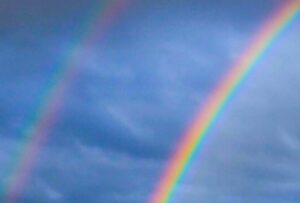 When I converted to Judaism in 2013, I took the Jewish name Micah-Noach. I chose Noach because we planned to move to Hawaiʻi, where rainbows are ubiquitous. As today’s parsha tells us, Hashem was very disappointed with man because his creation was so inclined to do evil. Consequently, Hashem decided to cause a great flood to wipe out all life on Earth so that he could restart his creation of life on Earth all over again. But because Noach was a righteous man in his time, Hashem spared Noach and his family. He also directed Noach to build the Ark so that they and the animals chosen by Hashem would survive the great flood. By his grace, Hashem entered into a covenant with Noach whereby Hashem agreed to never wipe out man again. Hashem marked this covenant with a rainbow.
When I converted to Judaism in 2013, I took the Jewish name Micah-Noach. I chose Noach because we planned to move to Hawaiʻi, where rainbows are ubiquitous. As today’s parsha tells us, Hashem was very disappointed with man because his creation was so inclined to do evil. Consequently, Hashem decided to cause a great flood to wipe out all life on Earth so that he could restart his creation of life on Earth all over again. But because Noach was a righteous man in his time, Hashem spared Noach and his family. He also directed Noach to build the Ark so that they and the animals chosen by Hashem would survive the great flood. By his grace, Hashem entered into a covenant with Noach whereby Hashem agreed to never wipe out man again. Hashem marked this covenant with a rainbow.
I was surprised to find out that neither Sandy nor I had ever done a drash on Noach. As I researched Noach on the Internet, I returned to one of my favorite sources, Rabbi Lord Jonathan Sacks (of blessed memory). My drash incorporates two of Rabbi Sack’s essays: “Noach (5769) – A Drama in Four Acts” and “Beyond Nature (Noach).” Between the creation of the universe and Hashem’s call to Abraham, the Torah tells four stories: first, Adam and Eve and the forbidden fruit in the Garden of Eden; second, Cain and Abel’s sibling rivalry; third, Noach and the great flood; and fourth, man’s construction of the Tower of Babel. Rabbi Sacks points out a subtle connection and deeper underlying logic to these colorful origination stories. First, Adam and Eve eat the forbidden fruit of the Tree of Knowledge and discover shame. When God asks them what they have done, Adam blames Eve and Eve blames the serpent. Both deny their personal responsibility. This is the birth of today’s victim culture.
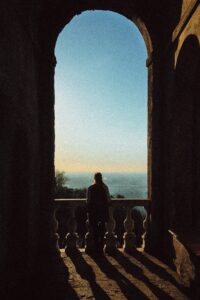 The second is about Cain and Abel and their respective offerings to Hashem. Abel’s offering is accepted but Cain’s offering is not. In his anger, Cain kills Abel. When Hashem asks Cain “Where is your brother Abel?” Cain replies: “I don’t know. Am I my brother’s keeper?” This is the birth of today’s cancel culture. Once again, the theme is responsibility, but Cain does not deny personal responsibility: he denies his moral responsibility. “I am not my brother’s keeper.” i.e., Yes, I did it because I felt like it and I can do it. But Cain had not yet learned the difference between “I can do it” and “I should or should not do it.”
The second is about Cain and Abel and their respective offerings to Hashem. Abel’s offering is accepted but Cain’s offering is not. In his anger, Cain kills Abel. When Hashem asks Cain “Where is your brother Abel?” Cain replies: “I don’t know. Am I my brother’s keeper?” This is the birth of today’s cancel culture. Once again, the theme is responsibility, but Cain does not deny personal responsibility: he denies his moral responsibility. “I am not my brother’s keeper.” i.e., Yes, I did it because I felt like it and I can do it. But Cain had not yet learned the difference between “I can do it” and “I should or should not do it.”
The third is the story about Noach. He is a righteous man, but he is not a hero. Noach does not try to save any human other than himself and his family. This is in stark contrast to Moshe, who prayed for the salvation of Jews, non-Jews and the stranger. As Jews, our Torah tells us that we must do what we can to save others and not just ourselves. Noach failed this test of collective responsibility for his fellow man.
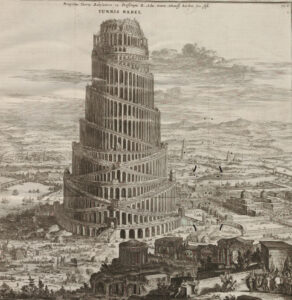 The fourth is about man’s construction of the Tower of Babel. Rabbi Sacks points out that it is a story about two key words in the first sentence of the Torah: “In the beginning God created Heaven and Earth.” God’s domain is in Heaven; man’s domain is on Earth. By attempting to build a tower that would reach heaven, the builders were men who were trying to become gods. In Judaism, one’s responsibility is to respond to the commands of Hashem and not to replace Hashem and the Torah with man’s laws. The Tower of Babel story is about man’s failure to embrace ontological responsibility—the idea that there is something beyond us and greater than us which commands us.
The fourth is about man’s construction of the Tower of Babel. Rabbi Sacks points out that it is a story about two key words in the first sentence of the Torah: “In the beginning God created Heaven and Earth.” God’s domain is in Heaven; man’s domain is on Earth. By attempting to build a tower that would reach heaven, the builders were men who were trying to become gods. In Judaism, one’s responsibility is to respond to the commands of Hashem and not to replace Hashem and the Torah with man’s laws. The Tower of Babel story is about man’s failure to embrace ontological responsibility—the idea that there is something beyond us and greater than us which commands us.
Thus, in Bereishit 1-11 there is a tightly constructed theme of responsibility and moral development. As children we learn that our acts are under our control (personal responsibility). Then we learn that anything we can do does not mean that we should do it (moral responsibility). As we mature, we realize we have a duty not just to ourselves but also to those on whom we have an influence (collective responsibility). Ultimately, we learn that morality is not a mere human convention, it is an essential quality that is written into the structure of our existence. Hashem is the creator of our existence, the giver of Torah and the one who exists beyond mankind (ontological responsibility). In Rabbi Sacks’ words: “We should never underestimate the subtlety and depth of the Torah. It was the first, and still is the greatest, text on the human condition and our psychological growth from instinct to conscience, from “dust of the earth” to the morally responsible agent the Torah calls “the image of God.”
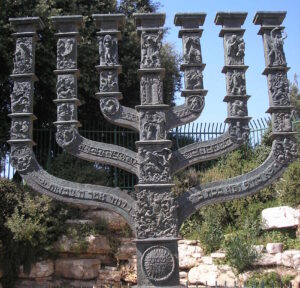
So, are we naturally good or naturally bad? Great minds have argued this question over the millennia. In Judaism, the Torah suggests that we are both destructive and constructive. We are born to compete and cooperate. Life is a competitive struggle for scarce resources, so we fight and even kill for them. However, we can obtain a competitive advantage by forming groups. Without the traits and habits of cooperation, altruism, and trust, we would have no groups and we would likely not survive.
So what does the Torah tell us about morality? First, it is universal. God’s covenant with Noach extends to all humanity and precedes Hashem’s particular covenant with Abraham and his later covenant with Moshe and the Jews at Mount Sinai. Our universal humanity precedes our religious differences. Moreover, monotheism contributes to more civilized behavior by making it easier to recognize that even our enemies, strangers, and persons not like us have rights, especially when one recognizes that there is one God who is the creator of and sovereign over all humanity. Second, Hashem recognizes that we are not naturally good. However, the antidote to man’s inclination to do evil, yetzer ha ra, is the morality that arises from our covenant, brit, with Hashem.
Micah is the other part of my Hebrew name. At the end of the Haftarah for Balak, the prophet Micah says: “He has told you, O man, what is good and what the Lord requires of you: only to do justice and to love goodness and to walk modestly with your God.” The Etz Hayim commentary notes that this is a classic expression of the primacy of morality over ritual. I pray that each of us embraces the Torah and our brit with Hashem so that we can be a light unto the nations in these trying times.
On Kohelet
November 1, 2021
By Fran Margulies
Why read this gloomy book on the joyful holiday of Sukkot? Let’s look at an excerpt:
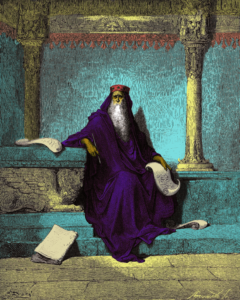 Southward blowing,
Southward blowing,
Turning northward,
Ever turning blows the wind;
On its rounds the wind returns.
All streams flow into the sea,
Yet the sea is never full;
To the place from which they flow,
The streams flow back again.
All such things are wearisome;
No man can ever state them;
The eye never has enough of seeing,
Nor the ear enough of seeing.
Only that shall happen
Which has happened,
Only that occur
Which has occurred.
There is nothing new
Beneath the sun!
Part of the answer is that there are two voices in Kohelet, a gloomy one and a (sort of) joyful one. Both voices are of one man arguing with himself. The voice is imagined to be that of King Solomon, David’s son, who had huge material wealth, who rebuilt the Temple, enjoyed political success, only to have it—and his country—fall apart three years later. Listen to his gloomy voice: “Hevel Hevalim!!” said Kohelet. “Hevel Hevalim!” All our efforts fail! They are unsubstantial as air, worthless as vapor. “Hevel” literally means “breath.” We at Sof recently had positive encounters with breath. We listened to Gregg joyfully blow the shofar at Rosh Hashannah; we heard Alan Kosansky at Yom Kippur tell us that breath is our close connection between all breathers.
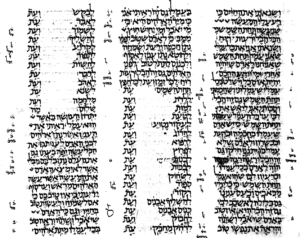
But Kohelet expands on—even wallows in—the negative, in all the ways that life disappoints! So, I asked, why then do we read him now, at happy harvest time? Because we hear a second voice in Kohelet, not exuberant but resigned:
How sweet is the light
how pleasant for eyes to behold the sun!
Enjoy life with the one you love all the fleeting days
of your life that have been granted you under the sun
In other words, accept the “lightness of being..,” the frustrations and perversity of life. Try to live more in the moment. Which is exactly what we do at Sukkot! We build flimsy, temporary structures open to rain and wind—but also open to whatever God has in store for us. So that is an answer to why we read Kohelet on Sukkot. The Megillat Kohelet captures both the fragility and the gratitude of the holiday: gratitude for this season’s rich autumn harvest, but also worry about our vulnerability to time, death, loss and despair. All that is left—but that is enough!—is trust in God.
Vayera Drash
October 30, 2021
By Alex Golub
Vayera is a drasher’s dream and also a drasher’s nightmare. I can’t think of another parshah which is so filled with stories, let alone stories which are so emotionally intense. The portion we read today recounts the akedah, the binding of Isaac. We read this portion on High Holy Days and I’ve drashed it a few times in that context, so I hope you do not mind if I range a bit more broadly over the entire parshah today.
Vayera’s stories focus on the most central experiences human beings can have: the giving and taking of life. In particular, it shows us how arbitrary the giving of life and death can be. God gives Sarah a life in the form of Isaac. Sarah then takes the lives of Hagar and Ishmael. God then gives life to Hagar and Ishmael. Abraham bargains with God to give life to the people of Sodom, but God takes them. Then God commands Abraham to take the life of Isaac, and then God gives it back.
To a certain extent Vayera’s tales of death and restoration are lazy writing. Any storyteller can elicit tears from an audience using these sorts heavy-handed plot twists. But Vayera avoids being just another tear jerker because it asks us to consider a very deep and important question: How we and our ancestors should respond to the arbitrariness of life and death. How can we as Jews control and tame the terrible facts of our morality?
This question plays out with special clarity when Abraham bargains with God for the lives of the people of Sodom. I just recently purchased the new JPS Miqraot Gedolot and I’ve enjoyed reading the medieval commentary on this section of the torah. Although now that I have mentioned this I am sure, Jews being the quarrelsome people we are, that someone will inform me I’ve purchased the wrong edition of this miqraot! At any rate, God goes to Sodom to investigate whether or not the people there are wicked or good. He doesn’t know yet. Abraham then famously asks that they be spared if 50 virtuous people could be found, which indicates he doesn’t have high hopes for Sodom. In doing so, Abraham asks God to act ‘justly’: “Shall not the judge of the earth deal justly?” he asks.
Yet at least one commenter points out, saving 50 people and killing the rest IS justice — it is the impartial application of God’s law. What Abraham is asking for is injustice. That is to say: Mercy. The sort of arbitrary intervention that gave Sarah a child and saved Hagar’s son. Another commenter has a powerful rejoinder: That saving the fifty and killing the rest would in fact be killing everyone, because the survivors would suffer so much from witnessing the destruction of the city that their normal human lives would be over.
There is also some debate among commenters about the nuts and bolts as Abraham works God down to a lower and lower number until he finally arrives at 10 people. Sodom is just the capital of an entire region which includes 5 cities. When Abraham asks for 50 people, does he mean 50 people in each city, or 10 in each for a total of 50? It is easy to see these sorts of questions as examples of small-minded legalism we all know and love. But doing so would be a mistake. It would cause us to overlook how tremendous the stakes are for Abraham.
Abraham knows the value of human life, and the difference between a good death and a bad one. It is one thing to lose a loved one in a hospital, quite another to send them out to starve in the desert, as Abraham did to Hagar and Ishamel. It is easy for us to speak in the abstract about 50 lives or a thousand. As the numbers grow larger the reality of each individual life becomes more abstract. Abravanel asks why Abraham stops at 10. Why not 9, or just 1? Is it because 10 is a minyan (Ibn Ezra)? Or perhaps if he got to 9 he knew God would just save the nine and destroy the city? Perhaps once we stop thinking about human life and start thinking about specific human lives empathy becomes inevitable.
Abraham succeeds in bargaining with God, but he loses his bet with reality: There aren’t 10 virtuous people in Sodom. The city’s destruction is the only time in this parshah where death is not halted and life is not arbitrarily protected. Unlike the akedah, lethal violence is not stayed at the last moment. But all is not in vain. Abraham’s attempt to stave off the destruction of Sodom shows us how Jews try to domesticate life’s arbitariness: We don’t give in when the odds are long. We try to preserve life as long as possible. We do not lose sight of the unique value of each individual human life, even when we bargain for them in abstract units of 50, 40, 30, 20, or 10. And when we suffer loss and sorrow, Jews are prepared as well. We have rituals and customs to deal with loss. We wrap death up in the tallit of our mitzvot. And most of all we remember that for every Sodom there is a miracle: a well in the wilderness, or a ram in a thicket. Shabbat Shalom.
A Drash For Rosh Hashanah
October 1, 2021
By Sid Goldstein
“Rosh Hashanah’s primary service is the submission to the sovereignty of heaven. Therefore, on these days, the greatest of individuals serve their god in the most direct way possible. “
– Rabbi Yosef Schneersohn of Lubavitch
It is no accident then, that the parshas for Rosh Hashanah involve Abraham. The stories told in Bereshit chapters 21 and 22 – the sending away of Ishmael and the binding of Isaac – involve direct service to Hashem. Both involve actions that strike modern Jews as unbearably harsh. But this harshness results in the direct service to which Rabbi Schneersohn refers. Recall that Abraham was chosen “so that he would instruct his children and his household after him to keep the ways of the Lord by doing what is right and just.” He was chosen to be a father. The first two letters of his name, Av, mean just that. Avram means “a mighty father.” Avraham, says the Torah, means “a father of many nations.”
Abraham was chosen to be a parental role model. But how could a man who banished his son Ishmael, sending him off with his mother to a possible death in the desert, be thought of as an exemplary father? How could a man who was willing to sacrifice his son Isaac be a model for future generations? According to Rabbi Lord Jonathan Sacks, these are not questions about Abraham. They are questions about the will of God. To quote Rabbi Lord Sacks: “For it was not Abraham who wanted to send Ishmael away. To the contrary, it distressed Abraham greatly because Ishmael was his son. It was God who told him to listen to Sarah and send the child away. Nor was it Abraham who wanted to sacrifice Isaac. It was God who told him to do so. Abraham was acting on both occasions against his emotions, against his paternal instincts.”
What, then, is the Torah telling us about the nature of fatherhood? It seems very difficult indeed to draw a positive message from these events. Listen to the words God spoke to Abraham in summoning him to the binding of his son: “Take your son, your only son, the one you love—Isaac—and go forth to the region of Moriah. Sacrifice him there as a burnt offering on a mountain I will show you.” These words inevitably remind us of God’s first summons to Abraham: “Go forth from your land, your birthplace and your father’s house” (Gen: 12.1). So, Abraham’s last trial echoed his first.
Note that the first command meant that Abraham had to abandon his father- seeming to neglect his duties as a son. So, whether as a father to his sons or as a son to his father, Abraham was commanded to behave in ways that would seem to be the exact opposite of how a son or father ought to behave. The barrier in our understanding of these events lies in the worldview of then versus now. Abraham, as a sort of faith pioneer, was instituting a new relationship between the generations. Essentially, what we are seeing in this portion of Genesis is the ascendance of individual faith. In antiquity, the basic social unit was not the individual but the family. Religious rituals were carried out around the fire at the family hearth. The father served as the priest, offering sacrifices to the various gods. The father also offered libations and incantations to the spirits of dead ancestors. There were no individuals in the modern sense in this form of religion. There was a family unit, under the head of the patriarch.
 The Torah was a radical break from this way of life. The late, famed British Anthropologist Mary Douglas, points out that the Torah was unique in the ancient world in making no requirement for sacrifice to ancestors and actually forbidding any attempts to communicate with the spirits of the dead. Monotheism was more than simply a belief in one god. According to Rabbi Lord Sacks again: “Because each human being was said to be in his image and because each could be a in direct relationship with him, the soul of an individual was now raised to a new prominence. This was not just true of fathers, but of mothers and children as well.” No longer were members of a family necessarily fused into a single religious unit. Each person within family was now recognized as a self, with their own identity and their own level of integrity.
The Torah was a radical break from this way of life. The late, famed British Anthropologist Mary Douglas, points out that the Torah was unique in the ancient world in making no requirement for sacrifice to ancestors and actually forbidding any attempts to communicate with the spirits of the dead. Monotheism was more than simply a belief in one god. According to Rabbi Lord Sacks again: “Because each human being was said to be in his image and because each could be a in direct relationship with him, the soul of an individual was now raised to a new prominence. This was not just true of fathers, but of mothers and children as well.” No longer were members of a family necessarily fused into a single religious unit. Each person within family was now recognized as a self, with their own identity and their own level of integrity.
Such changes do not happen overnight, and they cannot happen without wrenching dislocations. This dislocation is what happens during Abraham’s story. At the beginning, Abraham is told to separate himself from his father. In the middle, he is told to separate himself from his first son. Near the end, he is told to sacrifice his younger son. These painful episodes represent a new way of thinking about humanity and the role of the individual versus the role of the family as a religious unit. Separation followed by connection. This seems to be the Jewish way.
The eighteenth-century Talmudist Rabbi Jacob Emden says of this dichotomy;
This is how Hashem created the universe. First by separating all domains, day and night, upper and lower waters and sea and dry land- then filling each. This is how humanity has learned to create relationships- by separating and leaving space for another. Therefore, parents should not seek to control their children. Spouses should not seek to control one another. It is the distance between each of us that allows relationships to grow and fill in the gaps.
And so, it is logical as we enter a new year to look to the end of the life of Abraham to see the direction that this people, with its profound sense of destiny should turn in the future. After the death of Sarah, Abraham married a woman named Keturah and had six children by her. We are told nothing else about this woman, and the significance of the episode seems to be unclear. But, as Rabbi Emden said, “The Torah does not include incidental details.” The clue to the identity of Keturah is revealed in the Torah’s description of Abraham’s death:
“And Abraham expired and died in a good old age and was gathered to his people.”
“Isaac and Ishmael, his sons, buried him in the Cave of Machpelah, in the field of Ephron, the field which Abraham purchased from the children of Het.”
Ishmael’s presence at the funeral is surprising. After all, he had been sent away into the desert years before, when Isaac was young. Until now, we have assumed that the two half-brothers lived in total isolation from one another. Yet the Torah places them together at the funeral without a word of explanation. The ancient sages pieced together these puzzling details to form an enthralling story. First, they point out that Be’er Lachai Roi, the place from which Isaac was coming when Rebecca saw him, is mentioned once before in Genesis: It is the spot where Hagar, pregnant and fleeing from Sarah, encountered an angel who told her that she and her child would live. There is a Midrash which says that Isaac went to Be’er Lachai Roi in search of Hagar. When Isaac heard that his father was seeking a wife for him, he said, “Shall I be married while my father lives alone? I will go and return Hagar to him.” Hence the sages’ answer to the question: who was Keturah? She was, they said, none other than Hagar herself. It is not unusual for people in the Torah to have more than one name: Jethro, Moses’s father-in-law, had seven. Hagar was called Keturah because according to the sages, “she gave forth fragrance like incense.”
 This indeed integrates Abraham’s second marriage as an essential component of the Torah narrative. This also changes the painful story of the banishment of Ishmael. There is an extraordinary midrash by Rabbi Eliezer, which tells of how Abraham twice visited his son Ishmael. On the first occasion, Ishmael was not at home. His wife, not knowing Abraham’s identity, refused the stranger bread and water. Ishmael, continues the Midrash, divorced her and married a woman named Fatimah. This time, when Abraham visited, again not disclosing his identity, the woman gave him food and drink. The Midrash then says “Abraham stood and prayed before the Holy One, blessed be He, and Ishmael’s house became filled with all good things. When Ishmael returned, his wife told him about it, and Ishmael knew that his father still loved him. Father and son were reconciled.” The name of Ishmael’s second wife, Fatimah, is highly significant. In the Koran, Fatimah is the daughter of Mohammad. Thus, Rabbi Eliezer in an eighth-century work, is here making an explicit, and positive, reference to Islam.
This indeed integrates Abraham’s second marriage as an essential component of the Torah narrative. This also changes the painful story of the banishment of Ishmael. There is an extraordinary midrash by Rabbi Eliezer, which tells of how Abraham twice visited his son Ishmael. On the first occasion, Ishmael was not at home. His wife, not knowing Abraham’s identity, refused the stranger bread and water. Ishmael, continues the Midrash, divorced her and married a woman named Fatimah. This time, when Abraham visited, again not disclosing his identity, the woman gave him food and drink. The Midrash then says “Abraham stood and prayed before the Holy One, blessed be He, and Ishmael’s house became filled with all good things. When Ishmael returned, his wife told him about it, and Ishmael knew that his father still loved him. Father and son were reconciled.” The name of Ishmael’s second wife, Fatimah, is highly significant. In the Koran, Fatimah is the daughter of Mohammad. Thus, Rabbi Eliezer in an eighth-century work, is here making an explicit, and positive, reference to Islam.
The sages’ backstory for Chayei Sarah has immense consequence for our time. Jews and Muslims both trace their descent from Abraham – Jews through Isaac, Muslims through Ishmael. The fact that both sons stood together at their father’s funeral tells us that they too were reunited. Beneath the surface of the narrative in Chayei Sarah, the sages read the clues and pieced together a moving story of reconciliation between Abraham and Hagar on the one hand, Isaac and Ishmael on the other. Yes, there was conflict and separation; but that was the beginning. Unity was the end. There is a Talmudic lesson here for our own time. Between Judaism and other faiths in our world there is conflict and separation, but in the end we must strive for the unity that our Torah tells us Isaac and Ishmael found together.
Let us make this year, 5782 a year of striving for unity. Just as in the days of Abraham, we have all separated, but humanity must come together and unify. This is the only way to ensure the survival of this species that was made in the image of Hashem.
SHANA TOVAH!